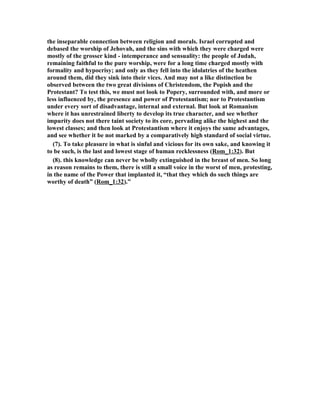This commentary on the Book of Romans compiles insights from various scholars to aid readers in understanding Paul's epistle, emphasizing its theological significance and unique position among his letters. Paul, addressing a church he did not found, presents a systematic exposition of Christian doctrine, focusing heavily on the nature of God and salvation. The document highlights the transformative impact of Romans on notable figures like Augustine and Luther, underlining its enduring value in Christian theology.
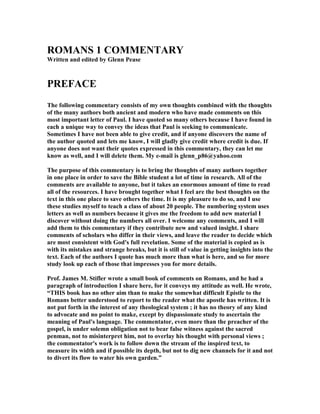

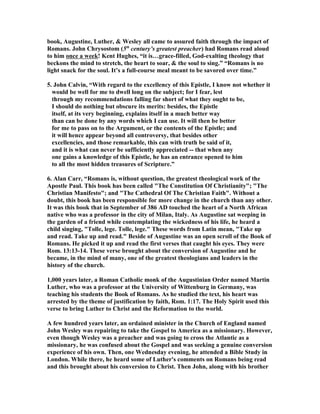
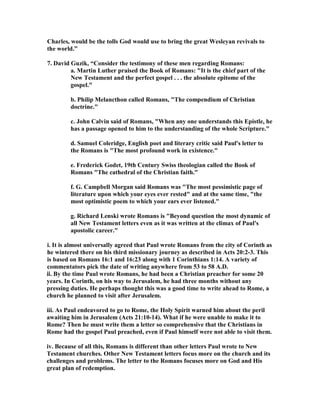









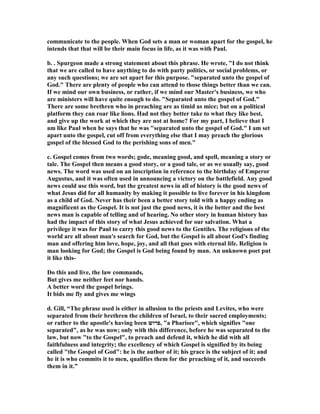





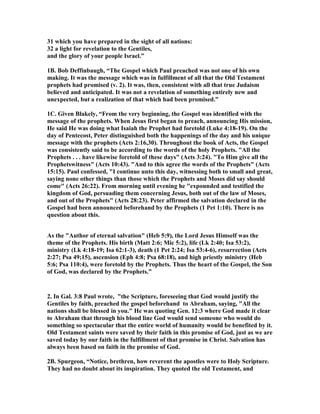


![Jews. He wished to show them, and the remainder of his countrymen, that the
Christian religion was built on the foundation of their prophets, and their
acknowledged writings. So doing, he would disarm their prejudice, and furnish a
proof of the truth of religion. It was a constant position with the apostle that he
advanced nothing but what was maintained by the best and holiest men of the
nation. Act_26:22-23, “saying none other things than those which the prophets and
Moses did say should come,” etc. There was a further reason here for his appealing
so much to the Old Testament. He had never been at Rome. He was therefore
personally a stranger, and it was proper for him then especially to show his regard
for the doctrines of the prophets. Hence, he appeals here so often to the Old
Testament; and defends every point by the authority of the Bible. The particular
passages of the Old Testament on which he relied will come before us in the course
of the Epistle. See particularly Rom. 3;4; 9; 10; 11. We may see here,
(1) The reverence which Paul showed for the Old Testament. He never
undervalued it. He never regarded it as obsolete, or useless. He manifestly
studied it; and never fell into the impious opinion that the Old Testament is of
little value.
(2) If these things were promised - predicted in the Old Testament, then
Christianity is true. Every passage which he adduces is therefore proof that it
is from God.
6. Look at Lk 24:27: And beginning with Moses and with all the prophets, He
explained to them the things concerning Himself in all of the Scriptures. He goes
back into the Old Testament. The good news didn’t begin when Jesus was born in
Bethlehem. The good news was announced beforehand by God through His
prophets. If we would look to see what they had to say, it all pointed to Jesus Christ,
the good news of God.
Look in John 5:39, 40 Jesus is talking to some of the religious folks there in verses
39-40: You search the Scriptures, because you think that in them you have eternal
life; and it is these that bear witness of Me; and you are unwilling to come to Me,
that you may have life. He is saying, I am the One who gives eternal life and the
Scriptures bear witness of Me.
Look down in Jn 5:46: For if you believed Moses, you would believe Me; for he
[Moses] wrote of Me. But if you do not believe his writings, how will you believe My
words? Jesus was saying, I have already been announced. Why do you look at Me
like I am some strange creature? The whole Old Testament pointed to My coming. I
am the good news of God.
7. Bob Deffinbaugh, “Paul highlights several of the fundamental elements of his
gospel:
(1) Paul’s gospel was based upon the belief in a triune God. Paul was a trinitarian.
In verses 2-4, Paul refers to all three members of the Godhead: the Father (verse 2),
the Son, who was of David’s seed, and who is exalted in the heavens, ready to reign](https://image.slidesharecdn.com/47022247-romans-1-commentary-141008141138-conversion-gate01/85/ROMANS-1-COMMENTARY-23-320.jpg)
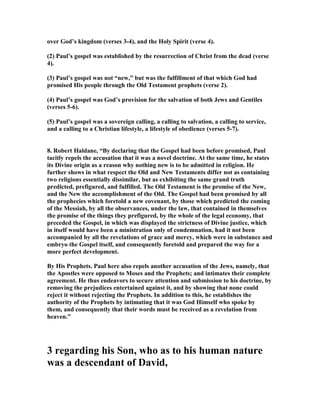


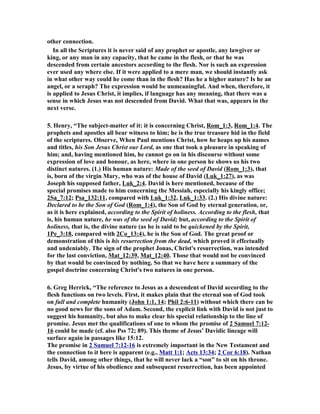




![origin, so too does His resurrection from the dead. You see, death could
never hold Jesus! He was perfectly holy and only submitted to death for
our sakes, John 10:18. All others who have ever lived and died are gone
from this earth forever, but not Jesus! He died and conquered death so
that those who follow Him might enjoy eternal life!”
2. It would not have been such a devastating problem for his disciples when Jesus
was crucified had they listened to him. He told them that he had the power to lay
down his life and then the power to take it again. He told them that they could
destroy his body and he would raise it again in three days. He even said, I am the
resurrection and the life. With all of this information they were still in a state of
unbelief when Jesus died. This became their greatest message after the resurrection,
but they could not grasp it before the resurrection.
2B. Calvin, “Concerning his own Son, etc. -- This is a remarkable passage, by
which we are taught that the whole gospel is included in Christ, so
that if any removes one step from Christ, he withdraws himself from the
gospel. For since he is the living and express image of the Father, it
is no wonder, that he alone is set before us as one to whom our whole
faith is to be directed and in whom it is to center. It is then a
definition of the gospel, by which Paul expresses what is summarily
comprehended in it. I have rendered the words which follow, Jesus
Christ our Lord, in the same case; which seems to me to be most
agreeable with the context. We hence learn, that he who has made a due
proficiency in the knowledge of Christ, has acquired every thing which
can be learned from the gospel; and, on the other hand, that they who
seek to be wise without Christ, are not only foolish, but even completely insane.”
2C. Calvin goes on, “Declared [19] the Son of God, etc.: or, if you prefer,
determined
(definitus); as though he had said, that the power, by which he was
raised from the dead, was something like a decree by which he was
proclaimed the Son of God, according to what is said in Psalm 2:7, I
have this day begotten thee: for this begetting refers to what was
made known. Though some indeed find here three separate evidences of
the divinity of Christ -- power, understanding thereby miracles --
then the testimony of the Spirit -- and, lastly, the resurrection from
the dead -- I yet prefer to connect them together, and to reduce these
three things to one, in this manner -- that Christ was declared the Son
of God by openly exercising a real celestial power, that is, the power
of the Spirit, when he rose from the dead; but that this power is
comprehended, when a conviction of it is imprinted on our hearts by the
same Spirit. The language of the Apostle well agrees with this view;
for he says that he was declared by power, because power, peculiar to
God, shone forth in him, and uncontestably proved him to be God; and
this was indeed made evident by his resurrection. Paul says the same](https://image.slidesharecdn.com/47022247-romans-1-commentary-141008141138-conversion-gate01/85/ROMANS-1-COMMENTARY-32-320.jpg)






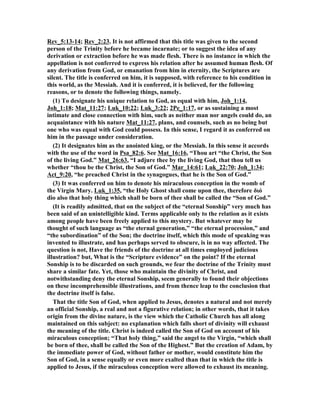


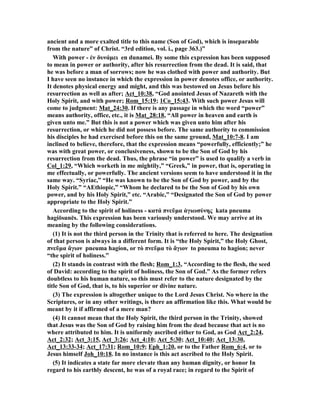
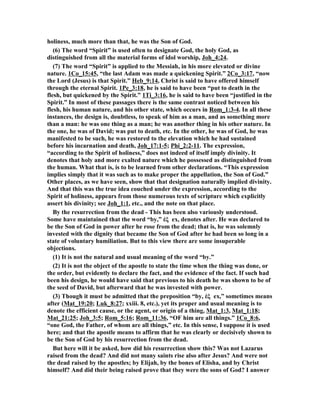
![that the mere fact of the resurrection of the body proves nothing in itself about the
character and rank of the being that is raised. But in the circumstances in which
Jesus was placed it might show it conclusively. When Lazarus was raised, it was not
in attestation of anything which he had taught or done. It was a mere display of the
power and benevolence of Christ. But in regard to the resurrection of Jesus, let the
following circumstances be taken into the account.
(1) He came as the Messiah.
(2) He uniformly taught that he was the Son of God.
(3) He maintained that God was his Father in such a sense as to imply equality
with him, Joh_5:17-30; Joh_10:36.
(4) He claimed authority to abolish the laws of the Jews, to change their customs,
and to be himself absolved from the observance of those laws, even as his Father
was, John 5:1-17; Mar_2:28.
(5) When God raised him up therefore, it was not an ordinary event. It was “a
public attestation, in the face of the universe, of the truth of his claims to be the Son
of God.” God would not sanction the doings and doctrines of an impostor. And
when, therefore he raised up Jesus, he, by this act, showed the truth of his claims,
that he was the Son of God.
Further, in the view of the apostles, the resurrection was intimately connected
with the ascension and exaltation of Jesus. The one made the other certain. And it is
not improbable that when they spoke of his resurrection, they meant to include, not
merely that single act, but the entire series of doings of which that was the first, and
which was the pledge of the elevation and majesty of the Son of God. Hence, when
they had proved his resurrection, they assumed that all the others would follow.
That involved and supposed all. And the series, of which that was the first, proved
that he was the Son of God; see Act_17:31, “He will judge the world in
righteousness, by that man whom he hath ordained, whereof he hath given
assurance to all people, “in that he hath raised him from the dead.” The one
involves the other; see Act_1:6. Thus, Peter Act_2:22-32 having proved that Jesus
was raised up, adds, Act_2:33, “therefore, being by the right hand exalted, he hath
shed forth this,” etc.; and Act_2:36, “therefore, let all the house of Israel know
assuredly that God hath made that same Jesus whom ye have crucified, both Lord
and Christ.”
This verse is a remarkable instance of the “apostle” Paul’s manner of writing.
Having mentioned a subject, his mind seems to catch fire; he presents it in new
forms, and amplifies it, until he seems to forget for a time the subject on which he
was writing. It is from this cause that his writings abound so with parentheses, and
that there is so much difficulty in following and understanding him.
11. Jamison, “And declared — literally, “marked off,” “defined,” “determined,”
that is, “shown,” or “proved.”
to be the Son of God — Observe how studiously the language changes here. He
“was MADE [says the apostle] of the seed of David, according to the flesh”
(Rom_1:3); but He was not made, He was only “declared [or proved] to BE the Son
of God.” So Joh_1:1, Joh_1:14, “In the beginning WAS the Word ... and the Word](https://image.slidesharecdn.com/47022247-romans-1-commentary-141008141138-conversion-gate01/85/ROMANS-1-COMMENTARY-44-320.jpg)
![was MADE flesh”; and Isa_9:6, “Unto us a Child is BOR, unto us a Son is
GIVE.” Thus the Sonship of Christ is in no proper sense a born relationship to the
Father, as some, otherwise sound divines, conceive of it. By His birth in the flesh,
that Sonship, which was essential and uncreated, merely effloresced into palpable
manifestation. (See on Luk_1:35; see Act_13:32, Act_13:33).
with power — This may either be connected with “declared,” and then the
meaning will be “powerfully declared” [Luther, Beza, Bengel, Fritzsche, Alford,
etc.]; or (as in our version, and as we think rightly) with “the Son of God,” and then
the sense is, “declared to be the Son of God” in possession of that “power” which
belonged to Him as the only-begotten of the Father, no longer shrouded as in the
days of His flesh, but “by His resurrection from the dead” gloriously displayed and
henceforth to be for ever exerted in this nature of ours [Vulgate, Calvin, Hodge,
Philippi, Mehring, etc.].
according to the spirit of holiness — If “according to the flesh” means here, “in
His human nature,” this uncommon expression must mean “in His other nature,”
which we have seen to be that “of the Son of God” - an eternal, uncreated nature.
This is here styled the “spirit,” as an impalpable and immaterial nature (Joh_4:24),
and “the spirit of holiness,” probably in absolute contrast with that “likeness, of
sinful flesh” which He assumed. One is apt to wonder that if this be the meaning, it
was not expressed more simply. But if the apostle had said “He was declared to be
the Son of God according to the Holy Spirit,” the reader would have thought he
meant “the Holy Ghost”; and it seems to have been just to avoid this
misapprehension that he used the rare expression, “the spirit of holiness.”
12. Robert Haldane, “On whatever subject Paul treats, he constantly introduces the
mystery of Christ. In writing to the Corinthians, he says, I determined not to know
anything among you, save Jesus Christ and Him crucified. This is a declaration that
the doctrine concerning Christ is the whole of religion, in which all besides is
comprehended. In delivering his instructions to the saints at Corinth respecting the
incestuous person, he points out to them Jesus Christ as the Lamb that was
sacrificed. If his subject respects the promises he has made, or the engagements he
has entered into, he draws our attention to the promises of God, which are all yea
and amen in Christ Jesus. When he treats of the precepts to be obeyed, he regards
them as connected with the knowledge of Christ. All duties are considered in
relation to Him, as the only Savior from whom we can derive power to fulfill them,
the only altar on which they can be accepted, that model according to which they
are to be performed, and the motive by which those who perform them are to be
actuated. He is the head that gives life to the members, the root which renders the
branches fruitful.
The Apostle John says, But these are written, that ye might believe that Jesus is the
Christ, the Son of God, by which he means to say who Christ is. Paul, after his
conversion, * preached Christ m the synagogues. And what did he preach
concerning Him ? That He was the Son of God. The great burden of Paul s doctrine
was, to prove that Jesus is the Son of God. That term, then, must definitely import
His Divine nature. It is not only used definitely, but as expressing the most](https://image.slidesharecdn.com/47022247-romans-1-commentary-141008141138-conversion-gate01/85/ROMANS-1-COMMENTARY-45-320.jpg)

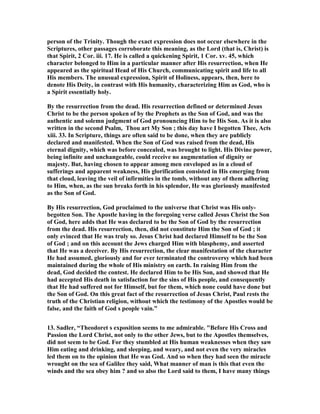
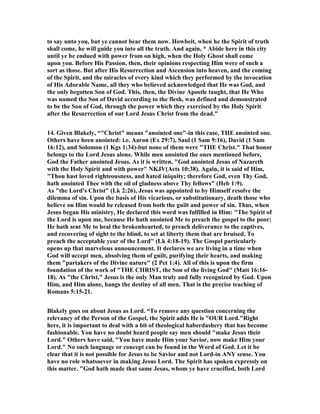

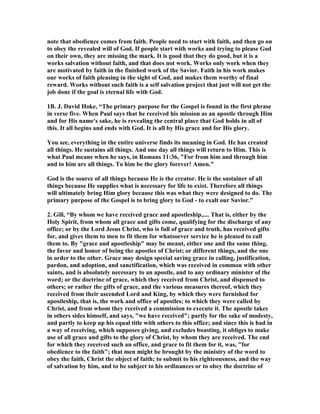



![incarnate Messiah (Romans 3:24-25; 5:18-21); and grace is poured out through the
risen and reigning Son of God in power. There is no grace toward sinners apart
from the life and death and resurrection of Jesus Christ. Verse 5 says plainly that
God gives grace through him, referring to Jesus Christ our Lord at the end of
verse 4. So grace is a reality that comes from God; and comes through Jesus and his
work for us. It is not something we have a right to. Jesus obtained it for us. We get it
freely because of the obedience and death of another.
But what is it? Well, in this verse it is connected with Paul’s ministry, his
apostleship. Through [Christ] we have received grace and apostleship. I take this
to mean that his calling as an apostle was a gift of grace and that he fulfils that
ministry by the power of this grace. So that grace is not just God’s clemency toward
Paul’s sin, but is also a power to enable Paul to do his calling as an apostle.
I base this on what Paul says about the relation between grace and ministry in
chapters 12 and 15. For example, in 12:6 Paul says, We have gifts that differ
according to the grace given to us. And in 12:3 he says, Through the grace given
to me I say to everyone among you . . . In other words, grace is God’s enabling for
various ministries through gifts he gives, and Paul’s gift includes speaking as an
apostle. Similarly in 15:15b-16 Paul says, Grace was given me from God, to be a
minister of Christ Jesus to the Gentiles. So I conclude that when he says in 1:5,
Through whom we have received grace and apostleship, he means that God not
only saved him from his sin, but he also gave him grace to be an authoritative
spokesman for the risen Son of God in power.
Grace has its own power. You don’t work it up. It is, in fact, part of the power
referred to in verse 4, where Paul says that Jesus was declared the Son of God with
power by the resurrection from the dead. Grace is not just forgiveness of our sin
and mercy on our misery, it is also a divine power that comes to us through Jesus
absolutely freely for the sake of ministry. Paul says in Romans 5:21, As sin reigned
in death, even so grace reigns through righteousness to eternal life through Jesus
Christ our Lord (my translation). Grace is the power of a king: it reigns and
leads mightily to eternal life through Christ.
God wants you to read verse 5 and in the end put your calling in the place of the
word apostleship. Apostleship is Paul’s – not mine and not yours. You might
put, Through Christ I have received grace and the teaching role. Or: grace and
singing. Or: grace and studentship. Or: grace and singleness. Or: grace and
widowhood. Or: grace and motherhood. And what you should mean is: God has
freely given me forgiveness and the power to do a calling, and fulfill a role which I
accept by faith.
There is not a role in life that can be lived the way God wants it lived apart from
enabling grace. Being a godly mother or being an apostle is impossible without the
power of grace. So when Paul says, in 1 Corinthians 15:10, that all his apostolic
labor is by grace, you insert your own calling: By the grace of God I am what I am,
and His grace toward me did not prove vain; but I labored even more than all of](https://image.slidesharecdn.com/47022247-romans-1-commentary-141008141138-conversion-gate01/85/ROMANS-1-COMMENTARY-54-320.jpg)
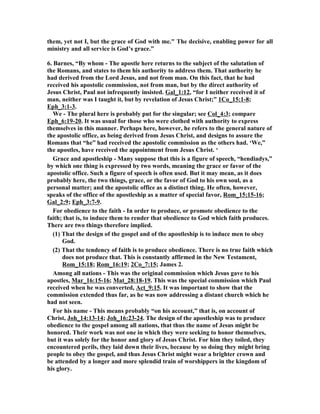

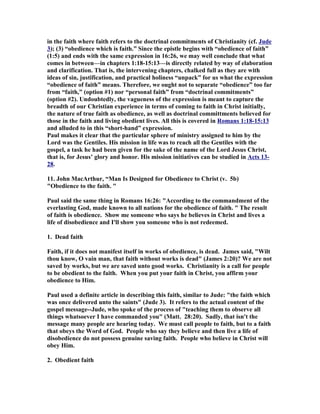

![God’s free gift before we do anything good, and his enabling of us to do anything
good. For example, in Romans 4:4 Paul says, ow to the one who works, his wage
is not credited according to grace, but according to debt (my translation). In other
words, grace is not what you get when you work for somebody: that’s what he owes
you. Grace is never owed. It is always a free bonus from the overflow of goodness.
Therefore grace is always received through faith, not earned by works. You can
only receive grace as a gift and acknowledge that it comes to you freely; you can’t
work for it or earn it. Romans 11:6 states the principle: If it [election] is by grace,
it is no longer on the basis of works, otherwise grace is no longer grace. Grace
would not be grace if you earned it by your works. We receive it through faith. By
simply welcoming it as a gift and relying on it.
This is why Romans 4:16 says, For this reason it [= being an heir of the promise] is
by faith, in order that it may be in accordance with grace. This is Paul’s way of
saying that grace is absolutely free and cannot be deserved or merited. When grace
comes to you it is through faith or not at all.
So when Paul says, in 1 Corinthians 15:10, that all his apostolic labor is by grace,
you insert your own calling: By the grace of God I am what I am, and His grace
toward me did not prove vain; but I labored even more than all of them, yet not I,
but the grace of God with me. The decisive, enabling power for all ministry and all
service is God’s grace.”
13. WORTHE
All men are commanded to obey God. God's call of obedience goes out to the world,
Repent of your sins and turn to My Son by faith for the forgiveness of your sins
and life eternal. This was the call which Paul extended to the Gentiles.
Men are to obey that call. But men choose to rebel, just like Adam and Eve. And so
much of the world does not obey. But of those who obey the call to repent and
believe by faith, obedience does not come to an end for us.
Obedience is inferred from the fact that we have a new Lord, the Creator of heaven
and earth, who desires that we walk according to His will, not ours. And so for Paul,
his obedience to Jesus Christ didn't end with him believing Christ; he continued his
obedience by being the apostle Christ called him to be. But his obedience wasn't
characterized by him kicking and screaming like a child who wants nothing to do
with cooperating with his parents.
Because he understood that Christ first loved him, his desire was to love Christ
through obedience. Whatever the Lord wanted of Paul he gladly did what Christ
wanted of him. But he did it in the grace and power of the Spirit by faith.
Even Jesus says in Mat 7:21 ot everyone who says to me, 'Lord, Lord,' will enter
the kingdom of heaven, but only he who does the will of my Father who is in
heaven.](https://image.slidesharecdn.com/47022247-romans-1-commentary-141008141138-conversion-gate01/85/ROMANS-1-COMMENTARY-59-320.jpg)



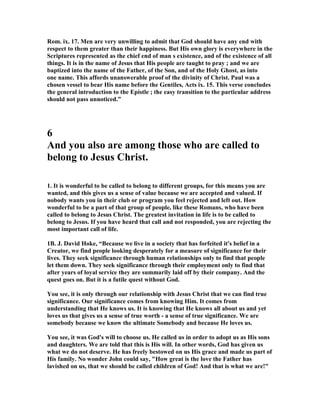
![(1 John 3:1).”
2. Gill, “Among whom are ye also,.... The Romans, though they were the chief, were
among the nations of the world to whom the apostles were sent; and since Paul was
called to be an apostle, and had, as others, grace and apostleship, and particularly
the apostleship of the uncircumcision, or was ordained a teacher of the Gentiles,
more especially he was an apostle to them, and as such was to be regarded by them.
This seems to point out what they were originally; they were among all nations
which lay in darkness; and were without Christ and hope, and God in the world;
but now,
the called of Jesus Christ. The calling here spoken of is not to an office, or a mere
external one by the ministry of the word, but an internal special call by the grace of
God; and which is irresistible, efficacious, and unchangeable, and is an high, holy,
and heavenly one; by it persons are called out of darkness into light, out of bondage
into liberty, out of the world, from the company of the men of it, and the sinful
pleasures thereof, to fellowship with Christ and his saints, and off a dependence on
themselves, and their own righteousness, to the grace and righteousness of Christ,
and to eternal glory. The persons so called are the elect of God, who are secured in
Christ, and redeemed by him, and who has a concern with the Father and Spirit in
the calling of them: hence they are styled, the called of Jesus Christ; they are
called by him, and after his name; he has an interest in them; as they were before
his chosen and redeemed ones, they are now his called ones; as Jacob and Israel of
old were named of God, מקראי , my called, Isa_48:12; so these were named
Christ's called ones; and who by calling came to be partakers of him and of his
grace.”
3. Barnes, “Among whom - That is, among the Gentiles who had become obedient to
the Christian faith in accordance with the design of the gospel, Rom_1:8. This
proves that the church at Rome was made up partly at least, if not mainly, of
Gentiles or pagans. This is fully proved in the xvith. chapter by the names of the
persons whom Paul salutes.
The called of Jesus Christ - Those whom Jesus Christ has called to be his
followers. The word “called” (see Rom_1:1) denotes not merely an external
invitation to privilege, but it also denotes the “internal” or “effectual” call which
secures conformity to the will of him who calls, and is thus synonymous with the
name Christians, or believers. That true Christians are contemplated by this
address, is clear from the whole scope of the Epistle; see particularly Rom. 8;
compare Phi_3:14; Heb_3:1.
4. Jamison, “Among whom are ye also — that is, along with others; for the apostle
ascribes nothing special to the Church of Rome (compare 1Co_14:36) [Bengel].
the called — (See on Rom_8:30).
of Christ Jesus — that is, either called “by Him” (Joh_5:25), or the called
“belonging to Him”; “Christ’s called ones.” Perhaps this latter sense is best
supported, but one hardly knows which to prefer.](https://image.slidesharecdn.com/47022247-romans-1-commentary-141008141138-conversion-gate01/85/ROMANS-1-COMMENTARY-64-320.jpg)




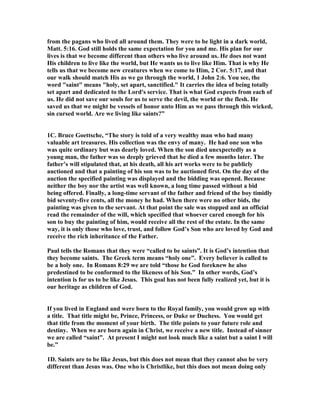
![what Jesus did.
Abraham married, Jesus never did
David danced before the Lord, Jesus never did.
Paul spoke in tongues, Jesus never did.
Peter wrote inspired Scripture, Jesus never did.
The point is there is no end to the things that saints do that Jesus never did. The
saint is not one who only does what Jesus did, but one who does all He does with the
spirit of Christ. A saint is one separated onto God, and so all people are either
saints or sinners. This does not mean saints don’t sin, or that sinners do not do
many good and noble things. But the center of the two lives are different. The saint
is God-centered, and the sinner is self-centered. As a saint we have an obligation to
be different from the world so that all that we do is directed toward God-centered
goals.
1E. Calvin, “ Grace to you and peace, etc. othing is more desirable than to have
God propitious to us, and this is signified by grace; and then to have
prosperity and success in all things flowing from him, and this is
intimated by peace; for however things may seem to smile on us, if God
be angry, even blessing itself is turned to a curse. The very
foundation then of our felicity is the favor of God, by which we enjoy
true and solid prosperity, and by which also our salvation is promoted
even when we are in adversities. [25] And then as he prays to God for
peace, we must understand, that whatever good comes to us, it is the
fruit of divine benevolence. or must we omit to notice, that he prays
at the same time to the Lord Jesus Christ for these blessings. Worthily
indeed is this honor rendered to him, who is not only the administrator
and dispenser of his Father's bounty to us, but also works all things
in connection with him. It was, however, the special object of the
Apostle to show, that through him all God's blessings come to us.
There are those who prefer to regard the word peace as signifying
quietness of conscience; and that this meaning belongs to it sometimes,
I do not deny: but since it is certain that the Apostle wished to give
us here a summary of God's blessings, the former meaning, which is
adduced by Bucer, is much the most suitable. Anxiously wishing then to
the godly what makes up real happiness, he betakes himself, as he did
before, to the very fountain itself, even the favor of God, which not
only alone brings to us eternal felicity but is also the source of all
blessings in this life.”
The ancient Greeks and Romans, says Turrettin, wished to those
to whom they wrote, in the inscription of their epistles, health, joy,
happiness; but Paul prays for far higher blessings even the favor of
God, the fountain of all good things, and peace, in which the Hebrews
included all blessings. -- Ed.](https://image.slidesharecdn.com/47022247-romans-1-commentary-141008141138-conversion-gate01/85/ROMANS-1-COMMENTARY-70-320.jpg)

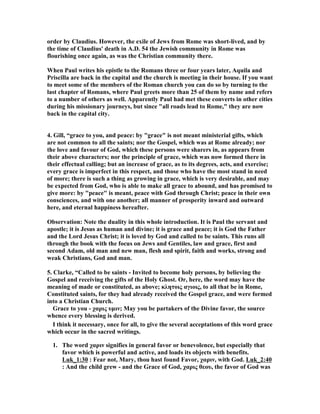
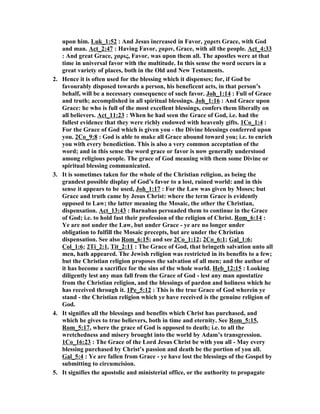
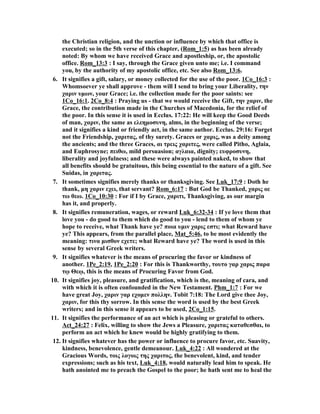




![became flesh, may be named beside Him; for men are commanded to honor Him
even as they honor the Father (Joh_5:23)” [Olshausen].
8. Henry, “The persons to whom it is written (Rom_1:7): To all that are in Rome,
beloved of God, called to be saints; that is, to all the professing Christians that were
in Rome, whether Jews or Gentiles originally, whether high or low, bond or free,
learned or unlearned. Rich and poor meet together in Christ Jesus. Here is, 1. The
privilege of Christians: They are beloved of God, they are members of that body
which is beloved, which is God's Hephzibah, in which his delight is. We speak of
God's love by his bounty and beneficence, and so he hath a common love to all
mankind and a peculiar love for true believers; and between these there is a love he
hath for all the body of visible Christians. 2. The duty of Christians; and that is to
be holy, for hereunto are they called, called to be saints, called to salvation through
sanctification. Saints, and only saints, are beloved of God with a special and peculiar
love. Klētois hagiois - called saints, saints in profession; it were well if all that are
called saints were saints indeed. Those that are called saints should labour to answer
to the name; otherwise, though it is an honour and a privilege, yet it will be of little
avail at the great day to have been called saints, if we be not really so.
IV. The apostolical benediction (Rom_1:7): Grace to you and peace. This is one of
the tokens in every epistle; and it hath not only the affection of a good wish, but the
authority of a blessing. The priests under the law were to bless the people, and so
are gospel ministers, in the name of the Lord. In this usual benediction observe, 1.
The favours desired: Grace and peace. The Old Testament salutation was, Peace be
to you; but now grace is prefixed - grace, that is, the favour of God towards us or the
work of God in us; both are previously requisite to true peace. All gospel blessings
are included in these two: grace and peace. Peace, that is all good; peace with God,
peace in your own consciences, peace with all that are about you; all these founded
in grace. 2. The fountain of those favours, from God our Father, and the Lord Jesus
Christ. All good comes, (1.) From God as a Father; he hath put himself into that
relation to engage and encourage our desires and expectations; we are taught, when
we come for grace and peace, to call him our Father. (2.) From the Lord Jesus
Christ, as Mediator, and the great feoffee in trust for the conveying and securing of
these benefits. We have them from his fulness, peace from the fulness of his merit,
grace from the fulness of his Spirit.
9. John MacArthur, “To all that be in Rome, beloved of God.
1. Ephesians 2:4-5--God, who is rich in mercy, for his great love with which he
loved us, even when we were dead in sins, hath made us alive together with Christ.
God loved us even when we were dead in sin.
2. 1 John 3:1--The apostle John said, Behold, what manner of love the Father hath
bestowed upon us, that we should be called the children of God. The phrase
translated what manner comes from the Greek word potap[ma]an, which means,
something foreign. It has to do with something that is otherworldly. God's love
for mankind is so different from any other kind of love, it as if it's from another
planet!](https://image.slidesharecdn.com/47022247-romans-1-commentary-141008141138-conversion-gate01/85/ROMANS-1-COMMENTARY-79-320.jpg)


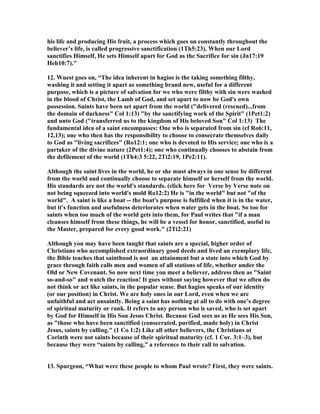








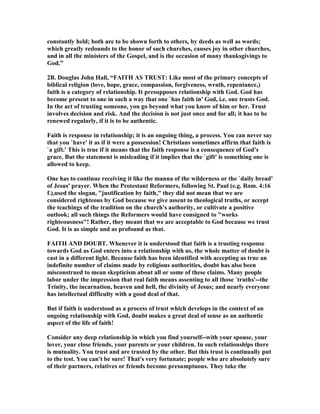
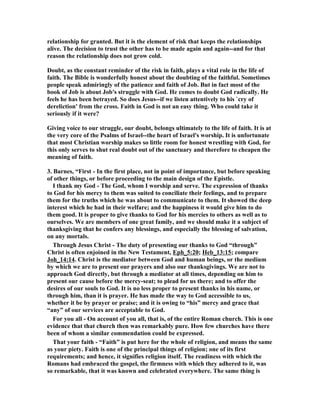

![Christians came to be thus talked of, not only because it was excelling in itself, but
because it was eminent and observable in its circumstances. Rome was a city upon a
hill, every one took notice of what was done there. Thus those who have many eyes
upon them have need to walk circumspectly, for what they do, good or bad, will be
spoken of. The church of Rome was then a flourishing church; but since that time
how is the gold become dim! How is the most fine gold changed! Rome is not what it
was. She was then espoused a chaste virgin to Christ, and excelled in beauty; but she
has since degenerated, dealt treacherously, and embraced the bosom of a stranger; so
that (as that good old book, the Practice of Piety, makes appear in no less than
twenty-six instances) even the epistle to the Romans is now an epistle against the
Romans; little reason has she therefore to boast of her former credit.
5. Brian Bill, “orma McCorvey, who is better known as the “Roe” of the infamous
Roe v. Wade Supreme Court ruling in 1973 that legalized abortion, has become a
born again Christian and is now unashamedly pro life. Amazingly, she will be the
keynote speaker at the Caring Pregnancy Center’s 20th Anniversary Celebration on
Thursday, April 6th right here in Pontiac! That’s right, three weeks from Thursday;
she will be speaking in the PTHS auditorium as she shares how her faith is the most
important part of her life. Her faith is being reported all over the world.
6. Bob Deffinbaugh, “This very positive statement from Paul must have been an
encouragement to the Roman saints. It would have been an encouragement to hear
that their faith was evident and was being shed abroad. It would also be an
encouragement to hear from Paul that his letter (not to mention his appearance, in
days to come) was not occasioned by problems in the church, but with a view to
their progress. This letter to the Romans was not a “trouble shooter’s” attempt to
fix a problem in the Roman church, but rather it was to encourage this church.
When Paul was able to come to them, he expected also to be encouraged by their
faith (1:12).
7. Worthen, “There at least eight things we learn about prayer from these verses:
1. Prayer Should Include Thanksgiving (Verse 8).
Paul was thankful to God for the Christians who lived in Rome, and he was
especially thankful for their FAITH. These people were FAMOUS FOR FAITH.
Their faith had gained them a world-wide reputation (compare 1 Thess. 1:8 where
we learn that the Thessalonian Christians were also famous for their faith). What is
FAITH? There are two simple Bible definitions of faith found in Romans 4:21 and
Acts 27:25. [Contrast the first century church of Rome, the one Paul wrote to, with
the Church of Rome today. The Church of Rome today is also famous -- famous for
its traditions, sacraments, ritual, papal leadership, etc. -- but not famous for faith in
God and His Word]. Paul was thankful that in the capital of the pagan Roman
empire there were those who worshipped and believed the true and living God.](https://image.slidesharecdn.com/47022247-romans-1-commentary-141008141138-conversion-gate01/85/ROMANS-1-COMMENTARY-94-320.jpg)

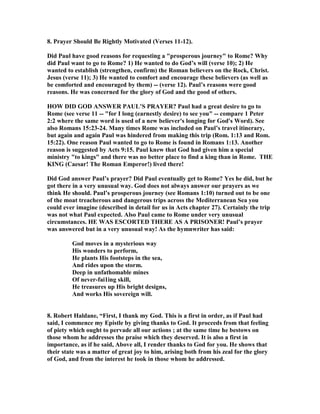


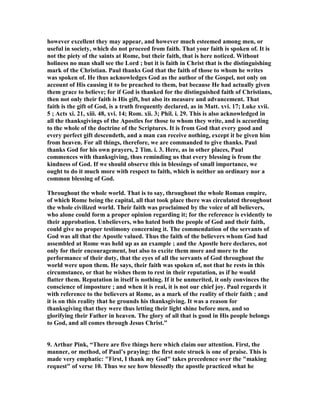
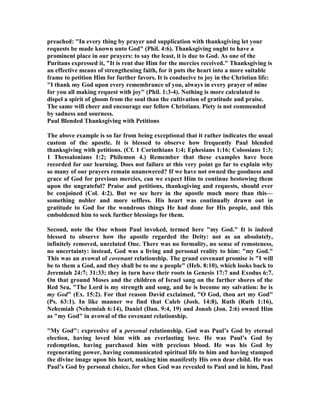
![had surrendered to His claims, saying, What wilt thou have me do? God, by
bestowing upon Paul His own nature after the apostle’s acceptance of His claims,
had become Paul’s everlasting portion, his all-satisfying inheritance. My God: the
One who had shown such sovereign and signal mercy to Paul. Their relationship
was also assured; there was no doubting, hesitation, or uncertainty. Paul could say
with Job, I have heard of thee by the hearing of the ear: but now mine eye seeth
thee (Job 42:5). And theirs was a practical relationship: whom I serve (Rom.
1:9).
ow put the two phrases together: I thank... my God. What a fitting
combination! Is not such a God worthy of infinite thanks? And if I know Him
personally as my God, will not, must not, thanksgiving issue spontaneously from my
heart and lips? The union of these phrases both opens the meaning of and gives due
force to the opening word, First, I thank my God—not first in enumeration, but
in emphasis, in spiritual order. If God Himself be mine, then everything that is pure,
holy, lovely, satisfying, is mine. If that glorious fact, that infinitely grand truth, be
the subject of constant meditation and adoration, then my heart will not be cold and
dull, nor will my mouth be paralyzed when I draw near to the throne of grace. It is
not an absolute and unrelated Deity whom I approach, but my God. And that
blessed and blissful relationship is to be duly acknowledged by the Christian when
he bows the knee before Him. So far from being the language of presumption, it
would be wicked presumption, insulting unbelief, to deny it.
Paul’s Ground of Approach
Third, note the ground of approach: through Jesus Christ. How thankful is the
writer (and the reader too, if regenerate) for this clause. Though God be my God
yet He ever remains the ineffably Holy One. How can I, conscious of pollution and
utter unworthiness, think of approaching infinite purity? Ah, here is the blessed
answer, the all-sufficient provision to meet my need: I may obtain access to the
thrice holy God through Jesus Christ. But suppose my assurance be dampened
and through sad failure in my walk I no longer enjoy the conscious relationship of
His being my God. How can I then give thanks to Him? Again, the answer is
through Jesus Christ. As it is written, By him [Jesus Christ] therefore [because
of the merit and efficacy of His sanctifying blood; see previous verse] let us offer the
sacrifice of praise to God continually, that is, the fruit of our lips giving thanks to his
name (Heb. 13:15). Whatever my case may be, however burdened with a sense of
guilt and defilement, that should not keep me away from the throne of grace,
neither should it deter me from giving thanks for Jesus Christ and God’s provision
of Him.
Grammatically the through Jesus Christ is connected with the giving of thanks,
but theologically or doctrinally there is a double thought. God is my God through
Jesus Christ. As He declared to His beloved disciples, I ascend unto my Father,
and your Father; and to my God, and your God (John 20:17b)—your God
because my God. And I give thanks unto my God through Jesus Christ, for it is](https://image.slidesharecdn.com/47022247-romans-1-commentary-141008141138-conversion-gate01/85/ROMANS-1-COMMENTARY-101-320.jpg)

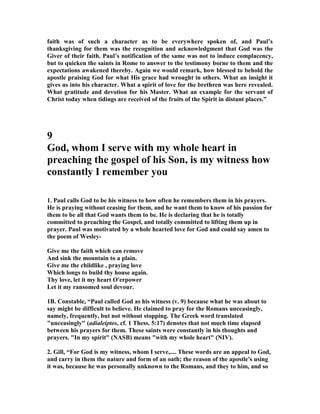





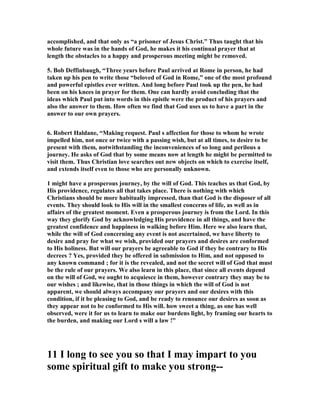


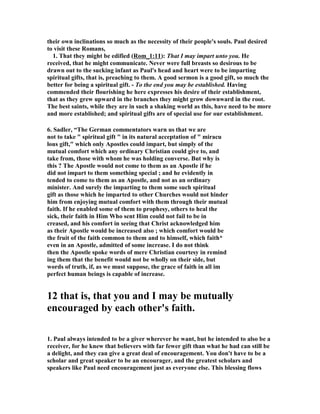



![5. Barnes, “That I may be comforted ... - It was not merely to confirm them that
Paul wished to come. He sought the communion of saints; he expected to be himself
edified and strengthened; and to be comforted by seeing their strength of faith, and
their rapid growth in grace. We may remark here,
(1) That one effect of religion is to produce the desire of the communion of saints.
It is the nature of Christianity to seek the society of those who are the friends
of Christ.
(2) othing is better suited to produce growth in grace than such communion.
Every Christian should have one or more Christian friends to whom he may
unbosom himself. o small part of the difficulties which young Christians
experience would vanish, if they should communicate their feelings and views
to others. Feelings which they suppose no Christians ever had, which greatly
distress them, they will find are common among those who are experienced in
the Christian life.
(3) There is nothing better suited to excite the feelings, and confirm the hopes of
Christian ministers, than the firm faith of young converts, of those just
commencing the Christian life, 3Jo_1:4.
(4) The apostle did not disdain to be taught by the humblest Christians. He
expected to be strengthened himself by the faith of those just beginning the
Christian life. “There is none so poor in the church of Christ, that he cannot
make some addition of importance to our stores,” Calvin.
6. Jamson, “That is, that I may be comforted together with you by the mutual faith
both of you and me — ot wishing to “lord it over their faith,” but rather to be a
“helper of their joy,” the apostle corrects his former expressions: my desire is to
instruct you and do you good, that is, for us to instruct and do one another good: in
giving I shall also receive” [Jowett]. “or is he insincere in so speaking, for there is
none so poor in the Church of Christ who may not impart to us something of value:
it is only our malignity and pride that hinder us from gathering such fruit from
every quarter” [Calvin]. How “widely different is the apostolic style from that of the
court of Papal Rome!” [Bengel].
7. Henry, “ That he might be comforted, Rom_1:12. What he heard of their
flourishing in grace was so much a joy to him that it must needs be much more so to
behold it. Paul could take comfort in the fruit of the labours of other ministers. - By
the mutual faith both of you and me, that is, our mutual faithfulness and fidelity. It is
very comfortable when there is a mutual confidence between minister and people,
they confiding in him as a faithful minister, and he in them as a faithful people. Or,
the mutual work of faith, which is love; they rejoiced in the expressions of one
another's love, or communicating their faith one to another. It is very refreshing to
Christians to compare notes about their spiritual concerns; thus are they sharpened,
as iron sharpens iron.
8. Haldane, “This comfort or confirmation which he looked for, was not from a](https://image.slidesharecdn.com/47022247-romans-1-commentary-141008141138-conversion-gate01/85/ROMANS-1-COMMENTARY-116-320.jpg)
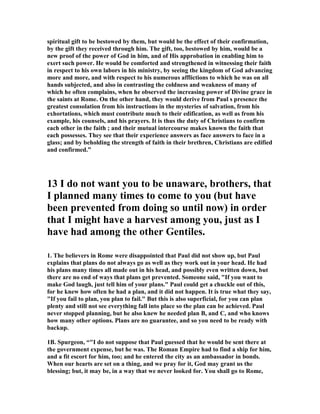


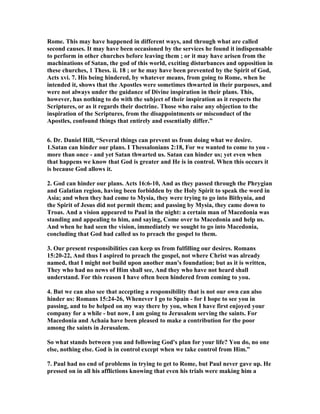





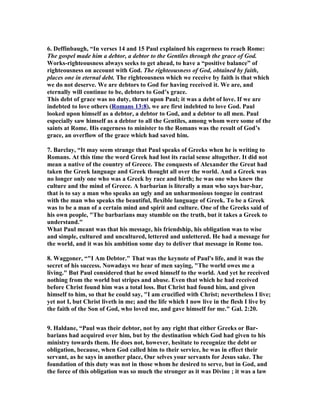
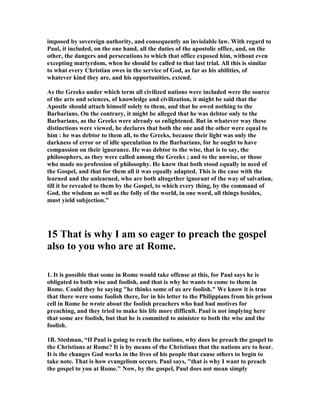


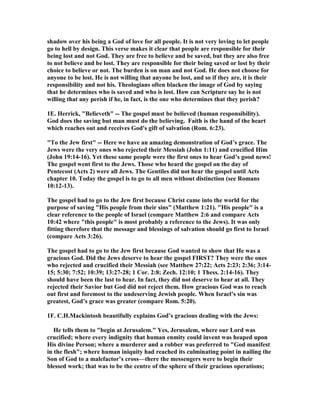



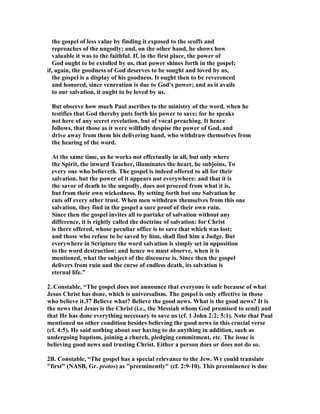
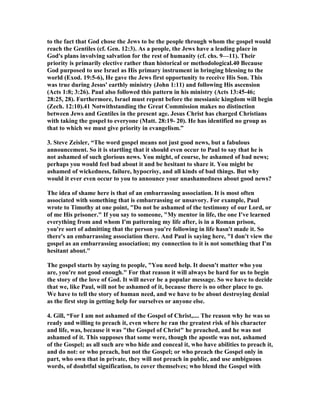
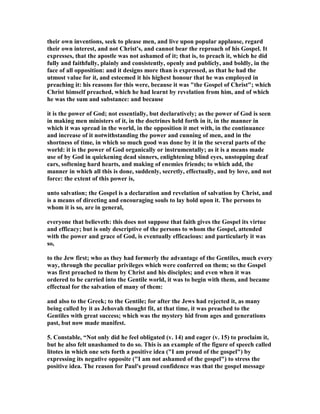






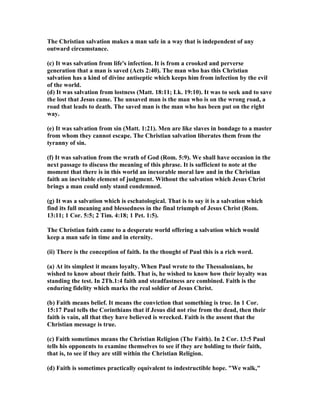
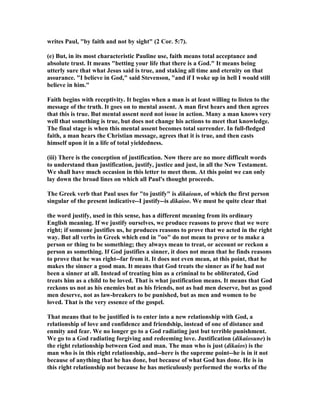







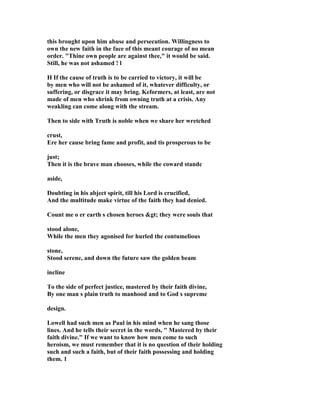





![in the morning were found standing white and frozen at their
posts like Lot s wife warning the Corsican to flee before the
vengeance of the forces of nature. And all along the line of his
retreat the elements carried on a guerilla warfare. From Moscow
to the Baltic the track of the discomfited army was marked by
the dead.
What does the Gospel possess that makes it a demonstration
of the power of God ? Two things especially,
(1) The first element of the dynamic content of the Gospel
is the lorn of God. In this, salvation had its originating motive
and cause. In this is the spring and source of the Gospel s power
on the human heart. The very conception of salvation originated
in God s love.
1 W. Pieroe.
TI A missionary from India once told this story to a meeting
at which I was present. She said, I went with another missionary
out into one of the Hindu villages to preach. It was a low-caste
village, and the low-caste women were sitting on the ground. My
sister began her sermon, and she said to them, God is love, and
God loves you. One of the women asked, What is love ?
Just think of that, a woman asking what is love ! The poor
missionary turned to her friend and said, What can I do when
a woman does not know what love is ? And she replied, Ask
these mothers how they feel towards their children. The preacher
turned to one poor woman sitting there half-naked, rocking her
half -naked baby in her arms, and said, How do you fee] towards
your babies? And the woman said, I am a poor, low-caste
woman, how can I tell how I feel towards my baby? The
missionary answered, Oh yes, you can ; you do know ; and the
mother replied, I do not know ; I feel a kind of going out of my
heart towards my baby. Yes, said the missionary, that is it,
and God feels a kind of going out of His heart to you. Is not
that good news ? You have come in here, out of sorrow, out
of sin, out of a wrestling and tugging with life is not this good
news you can really take to your heart, that the Eternal and the
Infinite has a kind of going out of His heart to you ? 1
(2) The second element of the dynamic content of the Gospel
is the righteousness of God which it reveals. Whenever men awaken
to a consciousness of guilt, they wish to work out a righteousness
of their own ; they think they can accomplish it by keeping the
law. We are taught in this Epistle and elsewhere that we cannot](https://image.slidesharecdn.com/47022247-romans-1-commentary-141008141138-conversion-gate01/85/ROMANS-1-COMMENTARY-158-320.jpg)







![just lives, is by faith. In the prophet Habakkuk, the words are, the just shall
live באמונתו , by his faith Hab_2:4); which the Septuagint render, by my faith:
and the apostle only reads, by faith, omitting the affix, as well known, and easy to
be supplied: for faith, when given by God, and exercised by the believer, is his own,
and by it he lives; not upon it, but by it upon Christ the object of it; from whom, in a
way of believing, he derives his spiritual life, and all the comforts of it.
3. Constable, “What did Paul mean by the righteousness of God?With the
exception of 2 Corinthians 5:21, Paul used this phrase only in Romans, where it
appears eight times (1:17; 3:5, 21, 22, 25, 26; 10:3 [twice]). It could be an attribute of
God, either His rectitude or His faithfulness. It could be a status that God gives to
people. Or it could be an activity of God, specifically, His saving action. For Paul,
as in the OT, 'righteousness of God' is a relational concept. Bringing together the
aspects of activity and status, we can define it as the act by which God brings people
into right relationship with himself.44 The gospel makes the righteousness of God
manifest. What does from faith to faith (ASB) mean? Was Paul describing the
way God has revealed His righteousness or how people should receive it?
The position of this phrase in the sentence favors the first option. The idea might be
that God's righteousness comes from one person who exercises faith to another
person who exercises faith. Still, if that is what Paul intended, he should have used
the Greek preposition apo that views from as a point of departure. Instead he
used ek that indicates the basis of something (cf. 3:16; 5:1; Gal. 2:16). Probably the
phrase refers to how people receive God's righteousness. The idea seems to be that
faith is the method whereby we receive salvation whatever aspect of salvation may
be in view and whomever we may be. The IV interpretation is probably correct:
by faith from first to last. We might say that every aspect of God's salvation
comes to us only by faith. That is true whether we are speaking of justification (past
salvation from the penalty of sin), practical sanctification (present salvation from
the power of sin), or glorification (future salvation from the presence of sin).
Trusting God results in full salvation.
The words of Habakkuk 2:4 support Paul's statement. Faith is the vehicle that
brings the righteousness of God to people. The person who believes the good news
that the righteous God has proclaimed becomes righteous himself or herself. The
Pharisees, one of which Paul had been, taught that righteousness came through
keeping the Mosaic Law scrupulously (cf. Matt. 5:20). The gospel Paul proclaimed,
on the other hand, was in harmony with what Habakkuk had revealed (cf. v. 2).
Many students of Romans believe that Habakkuk 2:4 is the text' of Romans, and
what follows is exposition of that Scripture text. Thomas suggested the following
outline: 1:1—3:20: the righteous; 3:21—4:25: by faith; and 5:1—16:26: shall live.45
Verses 16-17 are the key verses in Romans because they state the theme of the
revelation that follows. Paul's message was the gospel. He felt no shame declaring it
but was eager to proclaim it because it was a message that can deliver everyone who](https://image.slidesharecdn.com/47022247-romans-1-commentary-141008141138-conversion-gate01/85/ROMANS-1-COMMENTARY-166-320.jpg)




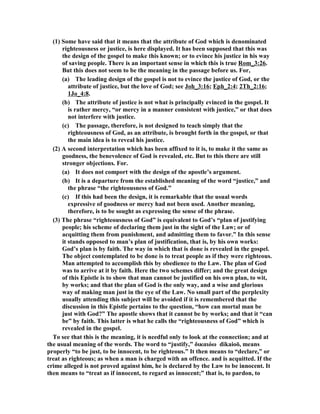





![him, we may, through him being propitious to us, obtain that life which
consists only in his favor; for, in order to be loved by God, we must
first become righteous, since he regards unrighteousness with hatred.
He therefore intimates, that we cannot obtain salvation otherwise than
from the gospel, since nowhere else does God reveal to us his
righteousness, which alone delivers us from perdition. ow this
righteousness, which is the groundwork of our salvation, is revealed in
the gospel: hence the gospel is said to be the power of God unto
salvation. Thus he reasons from the cause to the effect.
otice further, how extraordinary and valuable a treasure does God
bestow on us through the gospel, even the communication of his own
righteousness. I take the righteousness of God to mean, that which is
approved before his tribunal; [40] as that, on the contrary, is usually
called the righteousness of men, which is by men counted and supposed
to be righteousness, though it be only vapor. Paul, however, I doubt
not, alludes to the many prophecies in which the Spirit makes known
everywhere the righteousness of God in the future kingdom of Christ.
Some explain it as the righteousness which is freely given us by God:
and I indeed confess that the words will bear this sense; for God
justifies us by the gospel, and thus saves us: yet the former view
seems to me more suitable, though it is not what I make much of. Of
greater moment is what some think, that this righteousness does not
only consist in the free remission of sins, but also, in part, includes
the grace of regeneration. But I consider, that we are restored to life
because God freely reconciles us to himself, as we shall hereafter show
in its proper place.
But instead of the expression he used before, to every one who
believeth, he says now, from faith; for righteousness is offered by
the gospel, and is received by faith. And he adds, to faith: for as our
faith makes progress, and as it advances in knowledge, so the
righteousness of God increases in us at the same time, and the
possession of it is in a manner confirmed. When at first we taste the
gospel, we indeed see God's smiling countenance turned towards us, but
at a distance: the more the knowledge of true religion grows in us, by
coming as it were nearer, we behold God's favor more clearly and more
familiarly. What some think, that there is here an implied comparison
between the Old and ew Testament, is more refined than well-founded;
for Paul does not here compare the Fathers who lived under the law with
us, but points out the daily progress that is made by every one of the
faithful.
As it is written, etc. By the authority of the Prophet Habakkuk he
proves the righteousness of faith; for he, predicting the overthrow of](https://image.slidesharecdn.com/47022247-romans-1-commentary-141008141138-conversion-gate01/85/ROMANS-1-COMMENTARY-177-320.jpg)
![the proud, adds this -- that the life of the righteous consists in
faith. ow we live not before God, except through righteousness: it
then follows, that our righteousness is obtained by faith; and the verb
being future, designates the real perpetuity of that life of which he
speaks; as though he had said, -- that it would not be momentary, but
continue forever. For even the ungodly swell with the false notion of
having life; but when they say, Peace and safety, a sudden
destruction comes upon them, (1 Thessalonians 5:3.) It is therefore a
shadow, which endures only for a moment. Faith alone is that which
secures the perpetuity of life; and whence is this, except that it
leads us to God, and makes our life to depend on him? For Paul would
not have aptly quoted this testimony had not the meaning of the Prophet
been, that we then only stand, when by faith we recumb on God: and he
has not certainly ascribed life to the faith of the godly, but in as
far as they, having renounced the arrogance of the world, resign
themselves to the protection of God alone. [41]
He does not indeed professedly handle this subject; and hence he makes
no mention of gratuitous justification: but it is sufficiently evident
from the nature of faith, that this testimony is rightly applied to the
present subject. Besides, we necessarily gather from his reasoning,
that there is a mutual connection between faith and the gospel: for as
the just is said to live by faith, he concludes that this life is
received by the gospel.
We have now the principal point or the main hinge of the first part of
this Epistle, -- that we are justified by faith through the mercy of
God alone. We have not this, indeed as yet distinctly expressed by
Paul; but from his own words it will hereafter be made very clear --
that the righteousness, which is grounded on faith, depends entirely on
the mercy of God.”
8. Henry, “The justification of believers as the way (Rom_1:17): For therein, that is,
in this gospel, which Paul so much triumphs in, is the righteousness of God revealed.
Our misery and ruin being the product and consequent of our iniquity, that which
will show us the way of salvation must needs show us the way of justification, and
this the gospel does. The gospel makes known a righteousness. While God is a just
and holy God, and we are guilty sinners, it is necessary we should have a
righteousness wherein to appear before him; and, blessed be God, there is such a
righteousness brought in by Messiah the prince (Dan_9:24) and revealed in the
gospel; a righteousness, that is, a gracious method of reconciliation and acceptance,
notwithstanding the guilt of our sins. This evangelical righteousness, (1.) Is called
the righteousness of God; it is of God's appointing, of God's approving and
accepting. It is so called to cut off all pretensions to a righteousness resulting from
the merit of our own works. It is the righteousness of Christ, who is God, resulting
from a satisfaction of infinite value. (2.) It is said to be from faith to faith, from the](https://image.slidesharecdn.com/47022247-romans-1-commentary-141008141138-conversion-gate01/85/ROMANS-1-COMMENTARY-178-320.jpg)
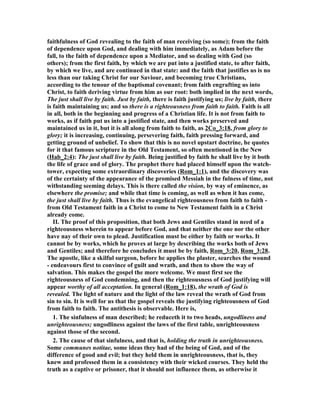
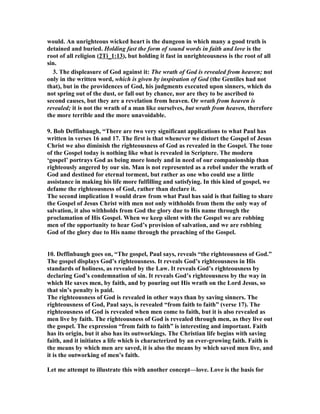

















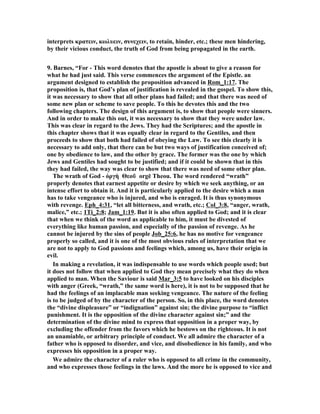





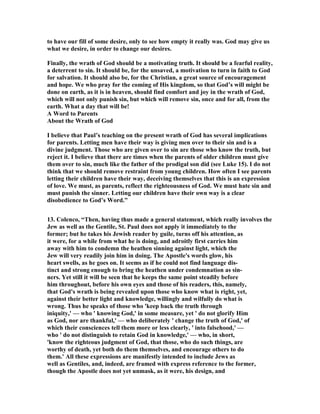



![fallen, even the very Heathens have some notion of him, as that there is a God; and
by the light of nature it might be known that there is but one God, who is glorious,
full of majesty, and possessed of all perfections, as that he is all powerful, wise, good
and righteous: and this
is manifest in them, or to them; by the light that is given them: it is light by which
that which may be known of God is manifest; and this is the light of nature, which
every man has that comes into the world; and this is internal, it is in him, in his
mind and conscience, and is communicated to him by God, and that by infusion or
inspiration; see Job_32:8;
for God hath showed it unto them; what may be known of him by that light; and
which is assisted and may be improved by a consideration of the works of creation
and Providence.
3. Clarke, “That which may be known of God - Dr. Taylor paraphrases this and the
following verse thus: “Although the Gentiles had no written revelation, yet what
may be known of God is every where manifest among them, God having made a
clear discovery of himself to them. For his being and perfections, invisible to our
bodily eyes, have been, ever since the creation of the world, evidently to be seen, if
attentively considered, in the visible beauty, order, and operations observable in the
constitution and parts of the universe; especially his eternal power and universal
dominion and providence: so that they cannot plead ignorance in excuse of their
idolatry and wickedness.”
4. Constable, “These verses begin a discussion of natural revelation. Verse 19
states the fact of natural revelation, and verse 20 explains the process.54 atural
revelation describes what everyone knows about God because of what
God has revealed concerning Himself in nature.55 What He has revealed
about Himself in Scripture is special revelation. The creation bears
testimony to its Maker, and every human being hears this witness (cf.
Ps. 19).56
apoleon, on a warship in the Mediterranean on a star-lit
night, passed a group of his officers who were mocking at
the idea of a God. He stopped, and sweeping his hand
toward the stars, said, 'Gentlemen, you must get rid of those
first!'57
Four things characterize this revelation. First, it is a clear testimony;
everyone is aware of it (it is evident [plain]). Second, everyone can
understand it. We can draw conclusions about the Creator from His
creation. His invisible attributes . . . have been clearly seen is an
oxymoron. Third, this revelation has gone out since the creation of the
world in every generation. Fourth, it is a limited revelation in that it does
not reveal everything about God (e.g., His love and grace) but only some
things (i.e., His power and divine nature).](https://image.slidesharecdn.com/47022247-romans-1-commentary-141008141138-conversion-gate01/85/ROMANS-1-COMMENTARY-208-320.jpg)
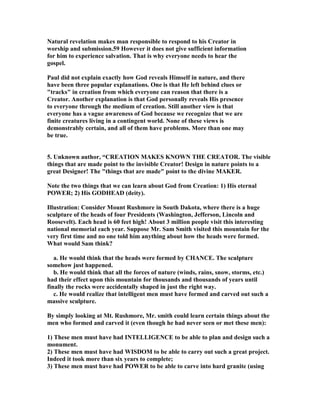
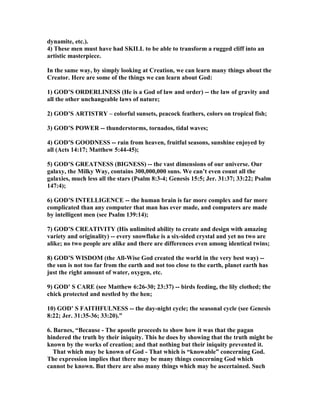

![(1.) Observe what they knew: The invisible things of him, even his eternal power
and Godhead. Though God be not the object of sense, yet he hath discovered and
made known himself by those things that are sensible. The power and Godhead of
God are invisible things, and yet are clearly seen in their products. He works in
secret (Job_23:8, Job_23:9; Psa_139:15; Ecc_11:5), but manifests what he has
wrought, and therein makes known his power and Godhead, and others of his
attributes which natural light apprehends in the idea of a God. They could not come
by natural light to the knowledge of the three persons in the Godhead (though some
fancy they have found footsteps of this in Plato's writings), but they did come to the
knowledge of the Godhead, at least so much knowledge as was sufficient to have
kept them from idolatry. This was that truth which they held in unrighteousness.
(2.) How they knew it: By the things that are made, which could not make
themselves, nor fall into such an exact order and harmony by any casual hits; and
therefore must have been produced by some first cause or intelligent agent, which
first cause could be no other than an eternal powerful God. See Psa_19:1;
Isa_40:26; Act_17:24. The workman is known by his work. The variety, multitude,
order, beauty, harmony, different nature, and excellent contrivance, of the things
that are made, the direction of them to certain ends, and the concurrence of all the
parts to the good and beauty of the whole, do abundantly prove a Creator and his
eternal power and Godhead. Thus did the light shine in the darkness. And this from
the creation of the world. Understand it either, [1.] As the topic from which the
knowledge of them is drawn. To evince this truth, we have recourse to the great
work of creation. And some think this ktisis kosmou, this creature of the world (as it
may be read), is to be understood of man, the ktisis kat' exochēn - the most
remarkable creature of the lower world, called ktisis, Mar_16:15. The frame and
structure of human bodies, and especially the most excellent powers, faculties, and
capacities of human souls, do abundantly prove that there is a Creator, and that he
is God. Or, [2.] As the date of the discovery. It as old as the creation of the world. In
this sense apo ktiseōs is most frequently used in scripture. These notices concerning
God are not any modern discoveries, hit upon of late, but ancient truths, which were
from the beginning. The way of the acknowledgment of God is a good old way; it
was from the beginning. Truth got the start of error.
8. Haldane, “The Apostle here assigns the reason of what he had just affirmed
respecting the Gentiles as suppressing the truth in unrighteousness,
namely, that which may be known of God, God hath manifested to them.
They might have said, they did not suppress the truth in unrighteous
ness, for God had not declared it to them as He had done to the Jews.
He had, however, sufficiently displayed, in the works of creation, His
almighty power, wisdom, and goodness, and other of His Divine attri
butes, so as to render them without excuse in their ungodliness and
unrighteousness.
That which may be known of God, that is to say, not absolutely, for
that surpasses the capacity of the creature. God is incomprehensible
even by angels, and it is by Himself alone that He can be fully and](https://image.slidesharecdn.com/47022247-romans-1-commentary-141008141138-conversion-gate01/85/ROMANS-1-COMMENTARY-212-320.jpg)


![energy and power could not create, then the creator of such things must be a being
superior to man. But the heavenly bodies in their eternal orbits could not be created
by man. They must therefore be created by a being greater than man ...Only an
arrogant fool would imagine that there was nothing in the whole world greater than
himself. Therefore there must be something greater than man. And that something
must be God.'
Chrysippus of Soli (c.280–c.207 BC) (Χρύσιππος ὁ Σολεύς) was a Greek Stoic
philosopher. He was a pupil of Cleanthes, and his successor, in 232 BC, as third
head of the Stoa[1] (see: Stoic philosophy). A prolific writer, Chrysippus expanded
the fundamental doctrines of Zeno of Citium (first of the Stoics), which earned him
the title of Second Founder of Stoicism.[1] He initiated the success of Stoicism as one
of the most influential philosophical movements for centuries in the Greek and
Roman world.[1]
2B. What we see tells us something about what we cannot see. The invisible is
revealed by the visible. The swaying trees and the sounds in the forest of trees tells
us about the invisible wind. The tender touch and kiss tells us of the invisible love a
couple has for each other. Order reveals mind, and the tear reveals emotion.
Ancient testimony backs up Paul. The following study is by an unknown author.
For example, it is from the writings of the Taoist Lao-tzu, who flourished in the
China of the 6th century BC, that the following profound statement concerning the
existence and some of the attributes of God is taken:
'Before time, and throughout time, there has been a self-existing being,
eternal, infinite, complete, omnipresent Outside this being, before the
beginning, there was nothing.'
The following ancient text from Heliopolis in Egypt testifies:
'I am the creator of all things that exist...that came forth from my mouth.
Heaven and earth did not exist, nor had been created the herbs of the ground
nor the creeping things. I raised them out of the primeval abyss from a state
of non-being...'
For example, amongst the early Greeks we have in the Theogony of Hesiod (8th
century BC) an account of the creation of the world that bears unmistakable and
remarkably close similarities with the Genesis account:
'First of all the Void came into being ...next Earth ...Out of the Void came
darkness ...and out of the ight came Light and Day...' (7)
And yet it is immediately obvious upon reading the whole of the Theogony that
Hesiod did not get his information from the book of Genesis. This is evident from
his debased view of the Creator alone. But even though Hesiod's debased view may
have been typical, and indeed understandable, for one who lived in a thoroughly
pagan society, it was by no means a view that was shared by all his fellow pagans.
Xenophanes, for example, who lived some two centuries after Hesiod, held an](https://image.slidesharecdn.com/47022247-romans-1-commentary-141008141138-conversion-gate01/85/ROMANS-1-COMMENTARY-215-320.jpg)
![altogether loftier view of the Creator and in a most inspiring passage sought to
redress the theological balance:
'Homer and Hesiod attributed to the gods all the things which among men
are shameful and blameworthy--theft and adultery and mutual deception...
[But] there is one God, greatest among gods and men, similar to mortals
neither in shape nor in thought ...he sees as a whole, he thinks as a whole, he
hears as a whole ...Always he remains in the same state, changing not at
all ...But far from toil he governs everything with his mind.' (8)
Xenophanes, typically, would have known the names of all the Greek gods as well as
the multitude of functions that they were thought to serve. Yet, significantly, and it
is a most significant point, he did not attempt to name or identify the God of whom
he now spoke and whom he clearly admired. This God was not a Zeus or a Hermes.
This God was ineffable, and His ineffability was a concept that was to persist in
Greek thought for as long as Greek philosophy itself was to persist. The concept of
this ineffable Creator God permeated the thought of Plato, for example, who sought
to replace Hesiod's perverse concepts of the Creation with a more reasonable one,
based no doubt upon philosophical concepts far more ancient than Hesiod's and
certainly far more profound:
'Let us therefore state the reason why the framer of this universe of change
framed it at all. He was good, and what is good has no particle of envy in it;
being therefore without envy, he wished all things to be as like himself as
possible. This is as valid a principle for the origin of the world of change as
we shall discover from the wisdom of men...' (9)
ote the echo from Genesis: 'And God saw that it was good.' We may also note here
that Plato had discovered this concept from the wisdom of philosophers who had
gone before him, and that it was therefore not something that originated in Plato's
thought alone. We can say though that, with the advent of Plato's refined and
carefully reasoned model of the Creation together with his (and Xenophanes')
higher concept of the Creator, it would seem that the classical Greek model of
origins was changed for all time. ever again was it to revert to the divine
capriciousness of the many Hesiodic gods for an explanation of the universe. The
creationist concept of the ancient world was rather to become, under Plato's
inspiration and that of his pupils, more 'scientifically' and logically based, with its
firm belief in a single and almighty Creator. However, in its wake, something far
more serious than the earlier Hesiodic misconception was to occur.
It is with some irony that whilst the philosophically nurtured concept of the Creator
was undergoing in ancient Greece such a profound shift towards a greater
appreciation of His nature and attributes, there was taking place at the same time
and in the same land the birth of another and hitherto unheard of concept amongst
the Greeks, atheism. We simply do not know how atheism came to be born in
ancient Greece, for, as we have seen, it was virtually an unheard of concept even in
the most pagan cultures of the ancient world. But given the timing of its advent
along with that of a higher concept of the Creator, which is of an equally mysterious
source historically speaking, it would seem that the atheism of ancient Greece was](https://image.slidesharecdn.com/47022247-romans-1-commentary-141008141138-conversion-gate01/85/ROMANS-1-COMMENTARY-216-320.jpg)


![from the creation of the world are clearly seen; this is no new discovery, but what
men have had, and might, by the light of nature, have enjoyed ever since the world
was created; these
being understood, in an intellectual way, by the discursive faculty of the
understanding,
by the things that are made; the various works of creation; all which proclaim the
being, unity, and perfections of God their Creator,
so that they are without excuse; the very Heathens, who have only the light of
nature, and are destitute of a revelation, have no colour or pretext for their
idolatrous practices, and vicious lives; nor have they, nor will they have anything to
object to God's righteous judgment against them, or why they should not be
condemned.
3B. Calvin, “God is in himself invisible;
but as his majesty shines forth in his works and in his creatures
everywhere, men ought in these to acknowledge him, for they clearly set
forth their Maker: and for this reason the Apostle in his Epistle to
the Hebrews says, that this world is a mirror, or the representation of
invisible things. He does not mention all the particulars which may be
thought to belong to God; but he states, that we can arrive at the
knowledge of his eternal power and divinity; [47] for he who is the
framer of all things, must necessarily be without beginning and from
himself. When we arrive at this point, the divinity becomes known to
us, which cannot exist except accompanied with all the attributes of a
God, since they are all included under that idea.
So that they are inexcusable. It hence clearly appears what the
consequence is of having this evidence -- that men cannot allege any
thing before God's tribunal for the purpose of showing that they are
not justly condemned. Yet let this difference be remembered, that the
manifestation of God, by which he makes his glory known in his
creation, is, with regard to the light itself, sufficiently clear; but
that on account of our blindness, it is not found to be sufficient. We
are not however so blind, that we can plead our ignorance as an excuse
for our perverseness. We conceive that there is a Deity; and then we
conclude, that whoever he may be, he ought to be worshipped: but our
reason here fails, because it cannot ascertain who or what sort of
being God is. Hence the Apostle in Hebrews 11:3, ascribes to faith the
light by which man can gain real knowledge from the work of creation,
and not without reason; for we are prevented by our blindness, so that
we reach not to the end in view; we yet see so far, that we cannot
pretend any excuse. Both these things are strikingly set forth by Paul
in Acts 14:16-17, when he says, that the Lord in past times left the](https://image.slidesharecdn.com/47022247-romans-1-commentary-141008141138-conversion-gate01/85/ROMANS-1-COMMENTARY-219-320.jpg)


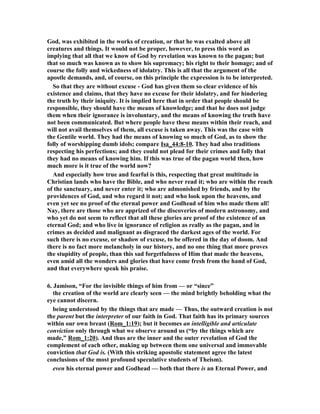

![Earth's crammed with heaven,
and every common bush aflame with God.
But only those who see take off their shoes;
the rest sit round it and pluck blackberries.
9. Unknown author, “The locus classicus that justifies a Christian’s study of natural
theology is Romans 1:20: “For the invisible things of [God] from the creation of the
world are clearly seen, being understood by the things that are made.” As a proof
text that natural theology exists, the text is decisive. One can come to know truths
about God by considering creation. As soon as we widen our consideration of the
text, however, we see that Paul gives a crucial caveat about natural theology. ote
first that Paul explicitly says that the natural theologians he is speaking about were
ungrateful, vain, hypocritical, foolish and idolatrous. It goes without saying that
Paul would condemn any natural theology which must end up like that. It is,
nevertheless, a real danger in natural theology. How so?
In the very next verse, Paul gives a crucial condemnation of the natural theologians
he was speaking of: “when they knew God, they have not glorified him as God or
given thanks.” This is the hinge between Romans 1:20, which allows for natural
theology, and the subsequent condemnation of the theologians themselves. Paul gets
it exactly right: one of the most frustrating things for someone who loves natural
theology is that it never seems to cross anyone’s mind that one must worship,
glorify, or give thanks to the God they prove. This manifests itself in many ways in
both those who practice natural theology and those who critique it. It’s as if
everyone relates to the God of natural theology as nothing more than a being to be
proved- he is a sort of sentence that follows from other sentences that must be
inspected for validity and soundness. The Christian critics of natural theology
assume the same sort of thing: so what if we proved God? Isn’t this just “the God of
the philosophers”?
It is a testimony to the darkness and vanity of the human intellect, and the self-absorption
of our will, that we can come to be convinced that there is a first cause of
all things, who created all being, and yet not immediately think of our need to
acknowledge his glory and give him thanks. And yet this is the situation that a
natural theologian frequently finds himself in. We are like airplane mechanics who
see exactly what must be fixed in order to keep the plane from crashing, but who
then consider this in a wholly academic way, never giving a thought to fixing the
problem. “Gosh, given that those bolts are missing, the engine will fall off! How
fascinating! I should incorporate this into my treatise against those who deny the
existence of planes.” There are certain kinds of knowledge that require man to do
something when he knows them: cf. watching a man die on the side of the road.
Action is a crucial difference between a wise man and a hypocrite: and the critics of
natural theology can pick up on this. They have a very easy time the absurdity of a
God that one proves but then fails to adore and worship.](https://image.slidesharecdn.com/47022247-romans-1-commentary-141008141138-conversion-gate01/85/ROMANS-1-COMMENTARY-224-320.jpg)
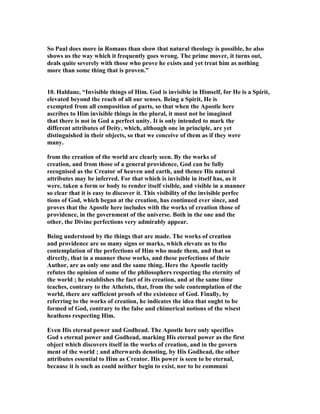







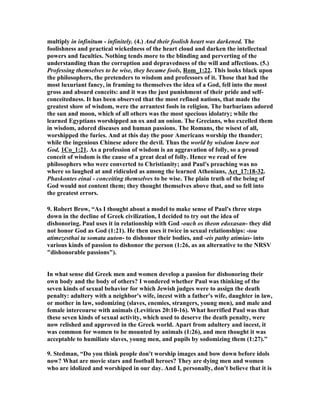



![and mercy. His eternity appears evident, because he is the maker of all
things -- his power, because he holds all things in his hand and
continues their existence -- his wisdom, because he has arranged things
in such an exquisite order -- his goodness, for there is no other cause
than himself, why he created all things, and no other reason, why he
should be induced to preserve them -- his justice, because in his
government he punishes the guilty and defends the innocent -- his
mercy, because he bears with so much forbearance the perversity of men
-- and his truth, because he is unchangeable. He then who has a right
notion of God ought to give him the praise due to his eternity, wisdom,
goodness, and justice. Since men have not recognized these attributes
in God, but have dreamt of him as though he were an empty phantom, they
are justly said to have impiously robbed him of his own glory. or is
it without reason that he adds, that they were not thankful, [48] for
there is no one who is not indebted to him for numberless benefits:
yea, even on this account alone, because he has been pleased to reveal
himself to us, he has abundantly made us indebted to him. But they
became vain, [49] etc.; that is, having forsaken the truth of God, they
turned to the vanity of their own reason, all the acuteness of which is
fading and passes away like vapor. And thus their foolish mind, being
involved in darkness, could understand nothing aright but was carried
away headlong, in various ways, into errors and delusions. Their
unrighteousness was this -- they quickly choked by their own depravity
the seed of right knowledge, before it grew up to ripeness.”
22
Although they claimed to be wise, they became
fools
1. Gill, “Professing themselves to be wise,.... The learned men among the Gentiles
first called themselves σοφοι, Sophi, wise men: and afterwards, to cover their
wretched pride and vanity, φιλοσοφοι, Philosophers, lovers of wisdom; but
notwithstanding all their arrogance, their large pretensions to wisdom, and boast of
it
they became fools; they appeared to be so; they showed themselves to be such in
those very things they prided themselves with the knowledge of: as, for instance,
Socrates, after he had asserted the unity of God, and is said to die a martyr for the
truth; yet one of the last actions of his life was sacrificing a cock to Aesculapius, at
least he desired his friend Crito to do it.](https://image.slidesharecdn.com/47022247-romans-1-commentary-141008141138-conversion-gate01/85/ROMANS-1-COMMENTARY-237-320.jpg)



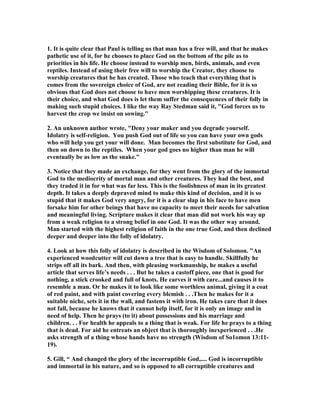




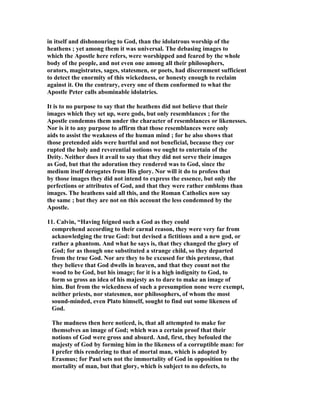





![providential restraints from them, and by giving them up to judicial hardness:
through the lusts of their own hearts. The heart of man is the source of all
wickedness; the lusts that dwell there are many, and these tend to uncleanness of
one sort or another: by it here is meant particularly bodily uncleanness, since it is
said they were given up
to dishonor their own bodies between themselves; either alone, or with others; so
that as they changed the glory of God, and dishonored him, he left them to dishonor
themselves by doing these things which were reproachful and scandalous to human
nature.
8. Barnes, “Wherefore - That is, because they were unwilling to retain him in their
knowledge, and chose to worship idols. Here is traced the practical tendency of
paganism; not as an innocent and harmless system, but as resulting in the most
gross and shameless acts of depravity.
God gave them up - He abandoned them, or he ceased to restrain them, and
suffered them to act out their sentiments, and to manifest them in their life. This
does not imply, that he exerted any positive influence in inducing them to sin, any
more than it would if we should seek, by argument and entreaty, to restrain a
headstrong youth, and when neither would prevail, should leave him to act out his
propensities. and to go as he chose to ruin. It is implied in this,
(1) That the tendency of man was to these sins;
(2) That the tendency of idolatry was to promote them; and,
(3) That all that was needful, in order that people should commit them, was for
God to leave him to follow the devices and desires of his own heart; compare
Psa_81:12; 2Th_2:10, 2Th_2:12.
To uncleanness - To impurity, or moral defilement; particularly to those
impurities which he proceeds to specify, Rom_1:26, etc.
Through the lusts of their own hearts - Or, in consequence of their own evil and
depraved passions and desires. He left them to act out, or manifest, their depraved
affections and inclinations.
To dishonor - To disgrace; Rom_1:26-27.
Between themselves - Among themselves; or mutually. They did it by unlawful
and impure connections with one another.
9. Jamison, “Wherefore God also — in righteous retribution.
gave them up — This divine abandonment of men is here strikingly traced in
three successive stages, at each of which the same word is used (Rom_1:24,
Rom_1:26; and Rom_1:28, where the word is rendered “gave over”). “As they
deserted God, God in turn deserted them; not giving them divine (that is,
supernatural) laws, and suffering them to corrupt those which were human; not
sending them prophets, and allowing the philosophers to run into absurdities. He let
them do what they pleased, even what was in the last degree vile, that those who had
not honored God, might dishonor themselves” [Grotius].](https://image.slidesharecdn.com/47022247-romans-1-commentary-141008141138-conversion-gate01/85/ROMANS-1-COMMENTARY-252-320.jpg)




![casts them headlong into various courses which lead to perdition and
ruin. And by comparing the vices, of which they were guilty, with the
impiety, of which he had before accused them, he shows that they
suffered punishment through the just judgment of God: for since nothing
is dearer to us than our own honor, it is extreme blindness, when we
fear not to bring disgrace on ourselves; and it is the most suitable
punishment for a reproach done to the Divine Majesty. This is the very
thing which he treats of to the end of the chapter; but he handles it
in various ways, for the subject required ample illustration.
What then, in short, he proves to us is this, -- that the ingratitude
of men to God is incapable of being excused; for it is manifest, by
unequivocal evidences, that the wrath of God rages against them: they
would have never rolled themselves in lusts so filthy, after the manner
of beasts, had not the majesty of God been provoked and incensed
against them. Since, then, the worst abominations abounded everywhere,
he concludes that there existed among them evidences of divine
vengeance. ow, as this never rages without reason, or unjustly, but
ever keeps within the limits of what is right, he intimates that it
hence appears that perdition, not less certain than just, impended over
all.
As to the manner in which God gives up or delivers men to wickedness,
it is by no means necessary in this place to discuss a question so
intricate, (longam -- tedious.) It is indeed certain, that he not only
permits men to fall into sin, by allowing them to do so, and by
conniving at them; but that he also, by his equitable judgment, so
arranges things, that they are led and carried into such madness by
their own lusts, as well as by the devil. He therefore adopts the word,
give up, according to the constant usage of Scripture; which word they
forcibly wrest, who think that we are led into sin only by the
permission of God: for as Satan is the minister of God's wrath, and as
it were the executioner, so he is armed against us, not through the
connivance, but by the command of his judge. God, however, is not on
this account cruel, nor are we innocent, inasmuch as Paul plainly
shows, that we are not delivered up into his power, except when we
deserve such a punishment. Only we must make this exception, that the
cause of sin is not from God, the roots of which ever abide in the
sinner himself; for this must be true,
Thine is perdition, O Israel; in me only is thy help.
(Hosea 13:9) [51]
By connecting the desires or lusts of man's heart with uncleanness, he
indirectly intimates what sort of progeny our heart generates, when
left to itself. The expression, among themselves, is not without its](https://image.slidesharecdn.com/47022247-romans-1-commentary-141008141138-conversion-gate01/85/ROMANS-1-COMMENTARY-257-320.jpg)



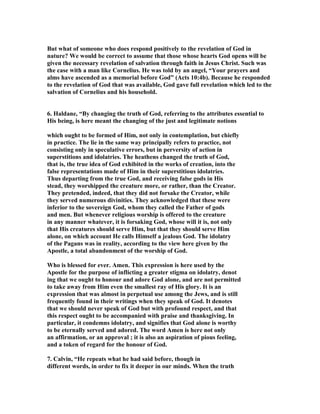
![of God is turned to a lie, his glory is obliterated. It is then but
just, that they should be besprinkled with every kind of infamy, who
strive to take away from God his honor, and also to reproach his name.
--
And worshipped, etc. That I might include two words in one, I have
given this rendering. He points out especially the sin of idolatry; for
religious honor cannot be given to a creature, without taking it away,
in a disgraceful and sacrilegious manner, from God: and vain is the
excuse that images are worshipped on God's account, since God
acknowledges no such worship, nor regards it as acceptable; and the
true God is not then worshipped at all, but a fictitious God, whom the
flesh has devised for itself. [52] What is added, Who is blessed for
ever, I explain as having been said for the purpose of exposing
idolaters to greater reproach, and in this way, He is one whom they
ought alone to have honored and worshipped, and from whom it was not
right to take away any thing, no, not even the least.
26
Because of this, God gave them over to shameful
lusts. Even their women exchanged natural
relations for unnatural ones.
1. Shameful lusts are lusts that pervert the natural lusts of men for women, and vice
versa. It is unnatural for women to want sex with other women. Homosexuality of
both men and women was a part of the culture of Paul's day, and we do not have to
watch a great deal of television to realize that it is also a common part of our culture
as well. There is no escaping the reality that American culture is reverting back to
the ways of the Roman empire of Paul's day, for sexual perversions are accepted as
a way of life for so many that the laws are changing to validate this life style.
However, even if Romans 1:26 were to be interpreted (contrary to the church
fathers in the first four centuries and the most informed modern scholarship) as
referring to female homoeroticism, it generally acknowledged to be the only text in
the entire Bible that might possibly be cited against lesbians.
1B. Constable, “Because mankind exchanged the truth for the lie God allowed
him to degrade himself through his passions. The result was that he exchanged
natural human functions for what is unnatural. In the Greek text the words
translated women (thelus; v. 26) and men (arsen, v. 27) mean females and
males. Ironically the homosexuality described in these verses does not](https://image.slidesharecdn.com/47022247-romans-1-commentary-141008141138-conversion-gate01/85/ROMANS-1-COMMENTARY-262-320.jpg)
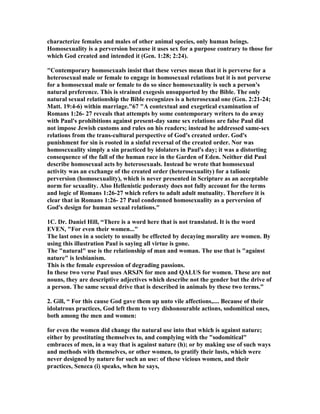






![way, and so in the end they cannot enjoy sex with the opposite sex, and live as
normal humans were created to live. Their judgment is to be abnormal.
4. The Bible reveals that men can get so addicted to homosexual activity that they
lose the normal desire to lust after the female body. In a study of Genesis 18:20;
19:4-9, George Zeller concludes, Several observations need to be made: (1) God's
evaluation of the enormity and weightiness of the sin of Sodom: And the LORD
said...their sin is very grievous [heavy] (Genesis 18:20). (2) The Sodomites,
thinking the two angels were men, lusted after them: bring them out unto us, that
we may know them [carnally] (Genesis 19:5). (3) Even Lot's offer of his own
daughters could not satisfy their unnatural desires (Genesis 19:8-9). (4) This terrible
and dreadful sin was repeated in the land of Israel during the period of the judges
(Judges 19:22-30). (5) The SERIOUSESS of the sin is seen by the SEVERITY of
the judgment. The Sodomite men were struck with blindness (Genesis 19:11) and
their city was destroyed by fire (Genesis 19:28-29). (6) Their sin was forever
memorialized by the terms Sodomite and Sodomy. (7) The sin of the Sodomites
also involved pride, prosperity and abundance of idleness (Ezekiel 16:49) and such
things most often lead to moral looseness and lewd immorality. (8) The sin of the
Sodomites is mentioned twice in the ew Testament as warning to those who should
live ungodly today (2 Peter 2:6 and Jude 7). For his extended study of
homosexuality in the Bible look him up on the internet. He covers the subject as
completely as anyone. He goes into depth on all the controversial issues surrounding
homosexuality. Go to http://www.middletownbiblechurch.org/doctrine/homozel.htm
4B. I just want to share one testimony from Zellers many words on the possibility of
homosexuals becoming heterosexuals. He wrote, A friend of mine is a national
spokesman for those struggling with homosexuality. He has also been active in
exposing the radical and militant gay agenda, and their attack on the traditional
family. My friend himself was gay and he was convinced that he was born that way
and could not change. For over a decade he indulged in the gay lifestyle and had
over 100 same sex partners. Then one day a friend shared with him the gospel of
Jesus Christ. Today he is happily married to a beautiful Christian woman and is the
proud father of two wonderful children. He is a living example that a homosexual
can change and can live a satisfying life by being the man, husband and father that
God would have him to be.
5. This being the case, how are we to think about the homosexual? They are sinners
just like everyone else, but their sin, in many cases, is deep seated in their very
genes. Sexual immorality of the heterosexual is just as wicked, and often just as
ingrained in their nature. All sexual behavior that violates God's revealed will is evil
and considered a sin. So all people are in the same category when it comes to sinful
sexual behavior. All need the grace of God to overcome this wicked and damaging
behavior. Many homosexuals become people who live without engaging in their
perversion, and many heterosexuals become people who cease to commit adultery
and having sex with women other than their mate. By the grace of God, and by faith](https://image.slidesharecdn.com/47022247-romans-1-commentary-141008141138-conversion-gate01/85/ROMANS-1-COMMENTARY-270-320.jpg)






![[1.] They did not like to retain God in their knowledge. The blindness of their
understandings was caused by the wilful aversion of their wills and affections. They
did not retain God in their knowledge, because they did not like it. They would
neither know nor do any thing but just what pleased themselves. It is just the
temper of carnal hearts; the pleasing of themselves is their highest end. There are
many that have God in their knowledge, they cannot help it, the light shines so fully
in their faces; but they do not retain him there. They say to the Almighty, Depart
(Job_21:14), and they therefore do not retain God in their knowledge because it
thwarts and contradicts their lusts; they do not like it. In their knowledge - en
epignōsei. There is a difference between gnōsis and epignōsis, the knowledge and the
acknowledgement of God; the pagans knew God, but did not, would not,
acknowledge him.
[2.] Answerable to this wilfulness of theirs, in gainsaying the truth, God gave them
over to a wilfulness in the grossest sins, here called a reprobate mind - eis adokimon
noun, a mind void of all sense and judgment to discern things that differ, so that
they could not distinguish their right hand from their left in spiritual things. See
whither a course of sin leads, and into what a gulf it plunges the sinner at last;
hither fleshly lusts have a direct tendency. Eyes full of adultery cannot cease from
sin, 2Pe_2:14. This reprobate mind was a blind scared conscience, past feeling,
Eph_4:19. When the judgment is once reconciled to sin, the man is in the suburbs of
hell. At first Pharaoh hardened his heart, but afterwards God hardened Pharaoh's
heart. Thus wilful hardness is justly punished with judicial hardness. - To do those
things which are not convenient. This phrase may seem to bespeak a diminutive evil,
but here it is expressive of the grossest enormities; things that are not agreeable to
men, but contradict the very light and law of nature. And here he subjoins a black
list of those unbecoming things which the Gentiles were guilty of, being delivered up
to a reprobate mind. o wickedness so heinous, so contrary to the light of nature, to
the law of nations, and to all the interests of mankind, but a reprobate mind will
comply with it. By the histories of those times, especially the accounts we have of the
then prevailing dispositions and practices of the Romans when the ancient virtue of
that commonwealth was so degenerated, it appears that these sins here mentioned
were then and there reigning national sins. o fewer than twenty-three several sorts
of sins and sinners are here specified, Rom_1:29-31. Here the devil's seat is; his
name is legion, for they are many. It was time to have the gospel preached among
them, for the world had need of reformation.”
8. Bruce Goettsche, “The depraved mind no longer submits to God’s standards.
Right and wrong are now determined by convenience and preference rather than by
the sure marker of God’s Word. When this happens certain behaviors are sure to
follow. Paul lists over 20 different behaviors (depending on the version you are
reading). Rather than attempt to spend time on each one, notice that they seem to
fall into some general categories:
1. How we view God (God-haters, faithless). This society will honor God with
their lips but their hearts will be far from Him. God will be systematically removed
from the public arena.](https://image.slidesharecdn.com/47022247-romans-1-commentary-141008141138-conversion-gate01/85/ROMANS-1-COMMENTARY-277-320.jpg)
![2. How we view others (greed, envy, malice, slander, insolence, arrogance,
boastfulness). The depraved society views others not as brothers, but as
competitors. They view each other as a “means to an end” rather than as people
who possess inherent worth and dignity. The value of life is diminished.
3. How we treat each other (murder, strife, deceit, malice, gossip, disobeying
parents). Love, respect and honor are replaced by superficial civility.
4. Issues of Character (depraved, senseless, faithless, heartless, ruthless). The
corruption runs to the very heart and soul of a person.
When a society turns from God, it begins to disintegrate. The code of the pigpen is
the rule: all that matters is getting what I want.
9. Unknown author, “Irrational fears, or phobias, torment many people. They may
be afraid of crowds or open spaces or heights. There's even a fear called theophobia,
which is either a dread that God exists or a strong denial of His existence.
But surely theophobia is rare, isn't it? Maybe not. We read in Romans that enemies
of God do all they can to expel any awareness of Him from their minds (1:28). They
become futile in their thoughts, and their foolish hearts [are] darkened (v.21).
We shouldn't be surprised, therefore, when Thomas agel, a professor of
philosophy and law at ew York University, uses logic to explain away the fear of
religion. In his book The Last Word, he candidly admits that he is strongly
subject to this fear, and says, I hope there is no God!
10. Deffinbaugh, “Sin involves both a man’s morals and his mind. What a man
thinks and how he lives are very much interrelated. Rejecting the truth about God
(mental) led to moral depravity. Immoral conduct also affects the mind—man’s
ability to think straight. And so the rejection of God’s revelation has led, Paul
writes, to “futile speculations” and a heart that is “darkened” (verse 21). When men
reach the point that they refuse “to acknowledge God any longer,” they are given
over “to a depraved mind” (verse 28), leading to the practice of those things which
are improper. If men will not act properly toward God, based upon His self-revelation,
then God will give men over so that they fail to act properly toward one
another. Men now, by their conduct, not only defile and dishonor themselves, they
are a plague to society. The outcome is a long list of sinful attitudes, dispositions,
and practices, all of which are destructive. The sins range from those which we do
not take too seriously (gossip, for example—see verse 30), to those which we
consider abominable (murder, for instance—see verse 29).”
11. Barclay Rom. 1:28-32k, “There is hardly any passage which so clearly shows
what happens to a man when he leaves God out of the reckoning. It is not so much
that God sends a judgment on a man, as that a man brings a judgment on himself](https://image.slidesharecdn.com/47022247-romans-1-commentary-141008141138-conversion-gate01/85/ROMANS-1-COMMENTARY-278-320.jpg)


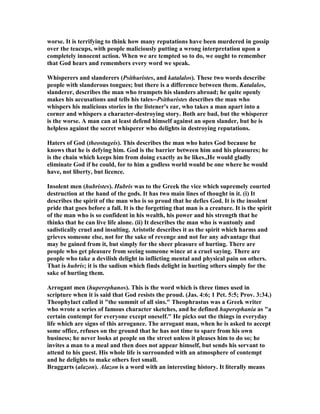


![God abandoned them. This is a terrible judgment: to give men up so that they
follow the impulses of their own corrupt minds, and so that they follow the desires
of their own depraved hearts! So I gave them up unto their own hearts' lust: and
they walked in their own counsels (Psalm 81:12).
13. Calvin, “And as they chose not, etc. There is an evident comparison to be
observed in these words, by which is strikingly set forth the just
relation between sin and punishment. As they chose not to continue in
the knowledge of God, which alone guides our minds to true wisdom, the
Lord gave them a perverted mind, which can choose nothing that is
right. [53] And by saying, that they chose not, (non probasse -
approved not,) it is the same as though he had said, that they pursued
not after the knowledge of God with the attention they ought to have
done, but, on the contrary, turned away their thoughts resignedly from
God. He then intimates, that they, making a depraved choice, preferred
their own vanities to the true God; and thus the error, by which they
were deceived, was voluntary.
To do those things which were not meet As he had hitherto referred only
to one instance of abomination, which prevailed indeed among many, but
was not common to all, he begins here to enumerate vices from which
none could be found free: for though every vice, as it has been said,
did not appear in each individual, yet all were guilty of some vices,
so that every one might separately be accused of manifest depravity. As
he calls them in the first instance not meet, understand him as saying,
that they were inconsistent with every decision of reason, and alien to
the duties of men: for he mentions it as an evidence of a perverted
mind, that men addicted themselves, without any reflection, to those
vices, which common sense ought to have led them to renounce.
14. Haldane, “The Apostle shows here how justly the Pagan idolaters were
abandoned
since they had so far departed from the right knowledge of God. In the
18th verse, he had declared that the wrath of God was revealed against
all ungodliness and unrighteousness of men. He had now conclusively
established the first charge of ungodliness against the Gentiles, adding to
it their consequent abandonment to the vilest affections ; he next pro
ceeds to demonstrate their unrighteousness.
And as they did not like. This is not quite literal, yet it seems the best
phrase that can be used to convey the spirit of the original. The word
in the Greek signifies to prove or approve. They did not approve of
retaining God in their knowledge. But this cannot mean that their
approbation respected their conscience, dark as it was. They did not
approve, because, as the common translation well expresses it, they did
not like. 1 There is no just ground to conclude, with Dr. Macknight, that](https://image.slidesharecdn.com/47022247-romans-1-commentary-141008141138-conversion-gate01/85/ROMANS-1-COMMENTARY-284-320.jpg)








![among the heathens, and made them practise and take pleasure in vicious
and unprofitable actions. Covetoumess. The original word strictly
signifies taking the advantage, overreaching in a bargain, having more
than what is just in any transaction with our neighbour. Of this,
covetousness is the motive. This was universal among rich and poor,
and was the spring of all their actions. Maliciousness denotes a disposi
tion to injury and revenge. Full of envy. Tacitus remarks that this
was the usual vice of the villages, towns, and cities. Murder was familiar
to them, especially with respect to their slaves, whom they caused to be
put to death for the slightest offences. Debate, strife about words for
vainglory, and not truth. Deceit was common to them all, and ex
emplified in their conduct and conversation, as is said, ch. iii. 13.
Malignity. Though the word in the original, when resolved into its
component parts, literally signifies bad custom or disposition, yet it
generally signifies something more specific, and is with sufficient pro
priety rendered malignity, which is a desire to hurt others without any
other reason than that of doing evil to them, and finding pleasure in their
sufferings. The definition of the term, as quoted from Aristotle by Dr.
Macknight, seems true rather as a specification than as a definition.
a disposition, he says, to take everything in the worst sense. o doubt
malevolence is inclined to this, but this is only one mode of discovering
itself. Whisperers. Dr. Macknight errs in saying that the original
word signifies those who secretly speak evil of persons when they are
present. The word does not import that the speaker whispers lest the
person against whom he speaks, being present, should hear. The person
spoken against may as well be absent. It refers to that sort of evil-speaking
which is communicated in secret, and not spoken in society. It
is called whispering, not from the tone of the voice, but from the secrecy.
It is common to speak of a thing being whispered, not from being com
municated in a low voice, but from being privately spoken to individuals.
It refers to sowing divisions. It is one of the most frequent and injurious
methods of calumny, because, on the one hand, the whisperer escapes con
viction of falsehood, and, on the other, the accused has no means of repelling
the secret calumny.
7. Calvin, “Understand by unrighteousness, the violation of justice among men,
by not rendering to each his due. I have rendered ponerian, according
to the opinion of Ammonium, wickedness; for he teaches us that poneron,
the wicked, is drastikon kakou, the doer of evil. The word (nequitia)
then means practiced wickedness, or licentiousness in doing mischief:
but maliciousness (malitia) is that depravity and obliquity of mind
which leads us to do harm to our neighbour. [54] For the word porneian,
which Paul uses, I have put lust, (libidinem.) I do not, however,
object, if one prefers to render it fornication; but he means the
inward passion as well as the outward act. [55] The words avarice,
envy, and murder, have nothing doubtful in their meaning. Under the](https://image.slidesharecdn.com/47022247-romans-1-commentary-141008141138-conversion-gate01/85/ROMANS-1-COMMENTARY-293-320.jpg)
![word strife, (contentione,) [56] he includes quarrels, fightings, and
seditions. We have rendered kakoetheian, perversity, (perversitatem;)
[57] which is a notorious and uncommon wickedness; that is, when a man,
covered over, as it were, with hardness, has become hardened in a
corrupt course of life by custom and evil habit.
8. An Unknown author gives us the list with an easier format to read. “Paul now
gives us (in verses 29-31) one of the most terrible and sobering lists of vices found
anywhere in the Bible. He gives us an appalling catalogue of the crimes of these
people. What we actually have here is GOD'S X-RAY of the human heart
(compare Jeremiah 17:9 and the words of Jesus in Mark 7:21-23). As we examine
this list, search your own heart. After reading each description ask yourself, Lord,
is it I? Have I been guilty of this? Is this a description of me?
FILLED WITH ALL URIGHTEOUSESS -- a general word (see verse 18) which
involves any kind of wrong thinking, speaking, acting or living.
FILLED WITH ALL FORICATIO -- This word is missing from some of the
Greek manuscripts, and this is why it is not found in some translations. We get our
word pornography from this Greek word. It is a general word for any kind of
illicit sex (anything contrary to what God established in Genesis 2).
FILLED WITH ALL WICKEDESS -- wickedness, evil, those who delight in doing
what is wrong
FILLED WITH ALL COVETOUSESS -- literally, to have more, the craving to
have more and more and more. The opposite of covetousness is contentment and
satisfaction. Thus it refers to people who are not satisfied with what they have
(greedy people).
FILLED WITH ALL MALICIOUSESS -- wickedness, depravity, badness in
general
FULL OF EVY -- jealousy (over what someone else has)
FULL OF MURDER -- remember, Jesus said that we can also be guilty of mental
murder which involves hatred and anger (Matthew 5:21-22).
FULL OF DEBATE -- strife, arguments, fightings, a quarrelsome disposition
FULL OF DECEIT -- a person who tricks and deceives and uses cunning
FULL OF MALIGITY -- evil disposition, bad manner or character, someone who
makes the worst out of the best
WHISPERERS -- secretly whispering about others (the Greek word is psithuristes](https://image.slidesharecdn.com/47022247-romans-1-commentary-141008141138-conversion-gate01/85/ROMANS-1-COMMENTARY-294-320.jpg)


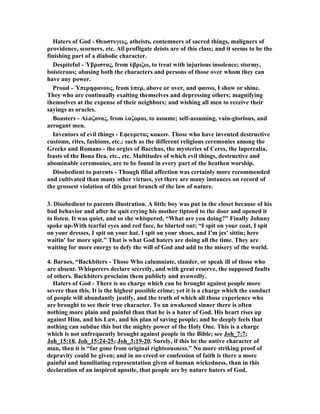


![joining in a confederacy for the devil's kingdom and interest. Suneudokousi: they do
not only commit sin, but they defend and justify it, and encourage others to do the
like. Our own sins are much aggravated by our concurrence with, and complacency
in, the sins of others.
ow lay all this together, and then say whether the Gentile world, lying under so
much guilt and corruption, could be justified before God by any works of their own.
6. Calvin, “The word theostugeis, means, no doubt, haters of God; for there is
no reason to take it in a passive sense, (hated of God,) since Paul
here proves men to be guilty by manifest vices. Those, then, are
designated, who hate God, whose justice they seem to resist by doing
wrong. Whisperers (susurrones) and slanderers (obtrectatores) [58] are
to be thus distinguished; the former, by secret accusations, break off
the friendships of good men, inflame their minds with anger, defame the
innocent, and sow discords; and the latter through an innate malignity,
spare the reputation of no one, and, as though they were instigated by
the fury of evilspeaking, they revile the deserving as well as the
undeserving We have translated hubristas, villanous, (maleficos;) for
the Latin authors are wont to call notable injuries villanies, such as
plunders, thefts, burnings, and sorceries; and these where the vices
which Paul meant to point out here. [59] I have rendered the word
huperephanous, used by Paul, insolent, (contumeliosos;) for this is the
meaning of the Greek word: and the reason for the word is this, --
because such being raised, as it were, on high, look down on those who
are, as it were, below them with contempt, and they cannot bear to look
on their equals. Haughty are they who swell with the empty wind of
overweeningness. Unsociable [60] are those who, by their iniquities,
unloose the bands of society, or those in whom there is no sincerity or
constancy of faith, who may be called truce-breakers.
7. Haldane, “Backbiters. The original word is here improperly translated
backbiters.
Dr. Macknight equally misses the meaning of this term, which he trans
lates revilers, distinguishing it from whisperers, or persons who speak
evil of others to their face, giving them opprobrious language and bad
names. The word indeed includes such persons ; but it applies to evil-speaking
in general, to those, in short, who take a pleasure in scandaliz
ing their neighbours, without any reference to the presence or absence of
those who are spoken against ; and it by no means designates, as he says,
the giving of opprobrious language and bad names. Such persons are
included in it, but not designated by it. Whisperers or tattlers are
evil-speakers, without any peculiar distinction. Our translators have
erred in rendering it backbiters. As Dr. Macknight has no authority to
limit the word to what is spoken face to face, it is equally unwarrantable
to confine it to what is spoken in the absence of those who are spoken
against. The word translated whisperers refers, according to Mr.](https://image.slidesharecdn.com/47022247-romans-1-commentary-141008141138-conversion-gate01/85/ROMANS-1-COMMENTARY-300-320.jpg)












![expect to behold under paganism. At this time, when the experiment had been made
for four thousand years, and when the inefficacy of all human means, even under
the most favorable circumstances, to reform mankind, had been tried, the gospel
was preached to people. It disclosed another plan; and its effects were seen at once
throughout the most abandoned states and cities of the ancient world.
4. If this was the state of things in the ancient pagan world, the same may be
expected to be the state of paganism still. And it is so. The account given here of
ancient pagans would apply substantially still to the pagan world. The same things
have been again and again witnessed in China, and Hindostan, and Africa, the
Sandwich islands, and in aboriginal America. It would be easy to multiply proofs
almost without end of this: and to this day the pagan world is exhibiting
substantially the same characteristics that it was in the time of Paul.
5. There was need of some better religion than the pagan. After all that infidels
and deists have said of the sufficiency of natural religion, yet here is the sad result.
This shows what man can do, and these facts will demonstrate forever that there
was need of some other religion than that furnished by the light of nature.
6. The account in this chapter shows the propriety of missionary exertions. So
Paul judged; and so we should judge still. If this be the state of the world, and if
Christianity, as all Christians believe, contains the remedy for all these evils, then it
is wisdom and benevolence to send it to them. And it is not wisdom or benevolence
to withhold it from them. Believing as they do, Christians are bound to send the
gospel to the pagan world. It is on this principle that modern missions to the pagan
are established; and if the toils of the apostles were demanded to spread the gospel,
then are the labors of Christians now. If it was right, and wise, and proper for them
to go to other lands to proclaim “the unsearchable riches of Christ,” then it is
equally proper and wise to do it now. If there was danger that the pagan world then
would perish without the gospel, there is equal danger that the pagan world will
perish now.
7. If it should be said that many of these things are practiced now in nations which
are called Christian, and that, therefore, the charge of the apostle that this was the
effect of paganism could not be well-founded, we may reply,
(1) That this is true, too true. But this very fact shows the deep and dreadful
depravity of human nature. If such things exist in lands that have a revelation, what
mush have been the state of those countries that had none of its restraints and
influences? But,
(2) These things do not exist where religion exerts its influence. They are not in
the bosom of the Christian church. They are not practiced by Christians. And the
effect of the Christian religion, so far as it has influence, is to call off people from
such vices, and to make them holy and pure in their life. Let religion exert its full
influence on any nominally Christian nation, and these things would cease. Let it
send its influence into other lands, and the world, the now polluted world, would
become pure before God.
7. Calvin, “Who, knowing the judgement [61] of God, etc. Though this passage is
variously explained, yet the following appears to me the correctest](https://image.slidesharecdn.com/47022247-romans-1-commentary-141008141138-conversion-gate01/85/ROMANS-1-COMMENTARY-313-320.jpg)


